Archived Storm Damage Blog Posts
When SERVPRO Is Called, Flood Water Damage Is Reduced
10/31/2023 (Permalink)
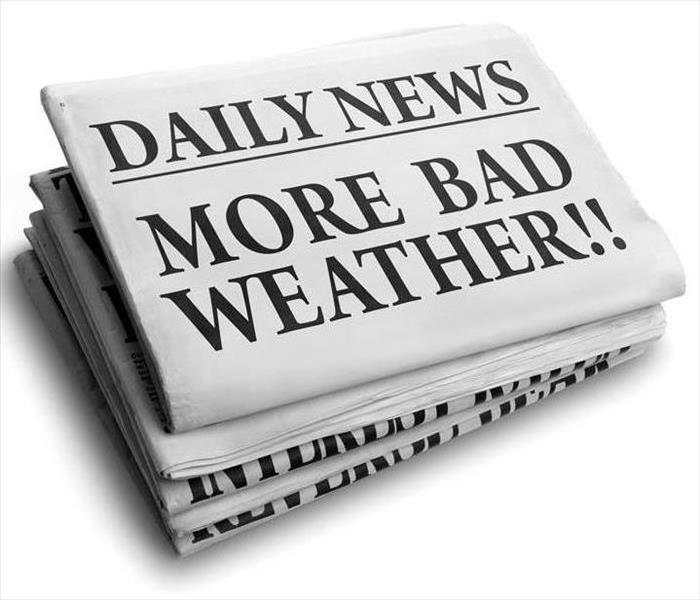 Be Prepared For Storm Damage in the Hickory, Newton, or Conover area.
Be Prepared For Storm Damage in the Hickory, Newton, or Conover area.
At SERVPRO, we pursue an aggressive strategy of mitigation, meaning we send out crews 24/7 as quickly as possible to respond rapidly to a scene and stop further damage from occurring. Some disasters rely on mitigation more than others, and flood damage is one of the more significant mitigation topics. We urge homeowners who have fallen victim to a flood to contact us as soon as possible, as a speedy response makes a big difference in how much time and money the situation ends up costing you.
When water floods an area, every nook and cranny are susceptible to significant water damage. If we can't respond quickly to a case of flood damage in Hickory, Newton, Conover, or the surrounding area, water will begin to work its way through cracks and corners into deeper regions of your home. In the worst cases, when the homeowner is away or unaware of the damage, it can even seep into and damage the building foundation.
Floodwaters breed mold, fungi, and present an environment for insects and microbes to expand in great numbers quickly. Early removal of floodwater is critical in stopping the growth and reproduction of these unwanted consequences. We will also need to initiate a thorough drying process to free the area from mold's grip, and pumping out water quickly is a vital first step to diminishing these effects.
Floods tend to open up areas to conditions that propagate further damage to the home, manipulating factors such as temperature, humidity, and air flow in the home. If we can respond quickly enough, we can set up equipment to control these variables before the flood ever gets a chance to disrupt the internal elements of the structure.
SERVPRO of Alexander & Caldwell Counties employs a strategy of mitigation to help prevent as much damage as possible to your home in the event of a disaster. If your home has been flooded, call us right away 24/7 at (828) 396-1070 so that we can respond quickly and begin to mitigate damage.
Know the Categories Of Water Intrusion
9/19/2022 (Permalink)
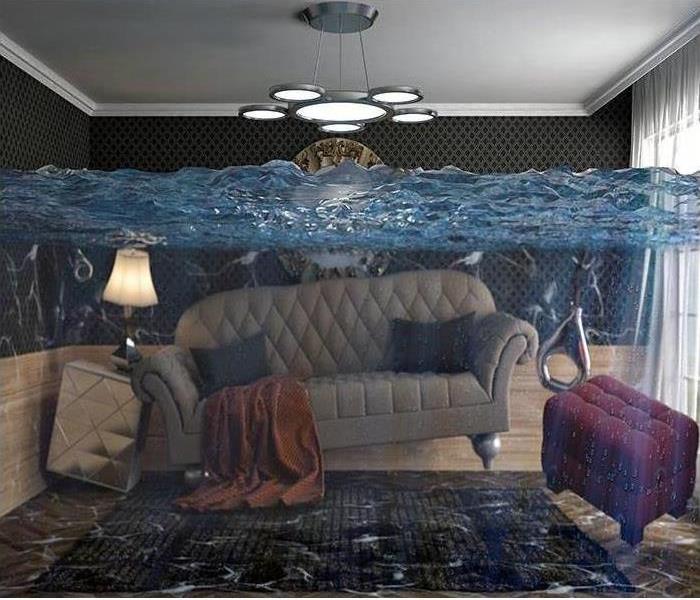 The scope and intensity of the repairs depend on how much water is inside the house and which materials are already wet.
The scope and intensity of the repairs depend on how much water is inside the house and which materials are already wet.
At SERVPRO, we like to remind our customers that no restoration job is impossible. While severe flooding can lead to complete destruction of some items, there are always others that are salvageable. In fact, as long as repairs get started within two days of the original incident, the chance of full remediation is high.
Nevertheless, the scope and intensity of the repairs depend on how much water is inside the house and which materials are already wet. When handling flood damage in the Hickory area, our technicians carry out an inspection first to determine the level of water intrusion. The assessment adheres to official guidelines from the IICRC. Keep reading to learn more about the categories of water intrusion and what they mean for Hickory area residents.
Class One
Class one involves minimal water intrusion, which means that this is the least serious type of water damage. Most items affected are non-porous (concrete floors, appliances, etc.) In this case, only limited repairs are necessary. Pumping is enough to extract most of the liquid, after which a small dehumidifier can be used to complete the job. Typical Scenario: a toilet overflows onto a sealed tile floor.
Class Two
There is a significant volume of water. Several porous items are affected (curtains, carpets, etc.) The extraction takes longer, in this case, because more water is absorbed. Dehumidifiers are used (for longer periods) to draw water vapor out of soft materials. Typical Scenario: a burst water pipe inside a gypsum board wall.
Class Three
Substantial amounts of standing water remain after the incident. Many porous items have absorbed flood liquids. The most intensive rates of evaporation are required to extract it in a timely fashion. The SERVPRO technicians probably need to lift carpets and (in some cases) make holes in the walls to increase ventilation. Typical Scenario: natural flooding causes rapid water intrusion, which quickly soaks the ground floor.
Class Four
The most severe type of flood damage involves water that gets trapped between building materials. It is tough to handle, takes a long time to restore, and it does cause lengthy disruptions to regular routines. The drying process is complex and requires the use of considerable vapor pressure differentials. Typical Scenario: a severe sewage overflow or backup which soaks through the walls.
At SERVPRO of Alexander, Caldwell, Catawba and Burke Counties, we approach every emergency with a unique strategy. Our repair methods are tailored to fit the needs of your home and guarantee a fast, effective restoration. Call us 24/7 at (828) 396-1070 today.
SERVPRO Dries Out Businesses After Storm Related Water Intrusion
9/6/2022 (Permalink)
 Businesses like a bakery needs SERVPRO for extracting storm water
Businesses like a bakery needs SERVPRO for extracting storm water
Businesses can suffer much less damage from a severe storm than a residence and still have to close their doors permanently. Each hour and day of clean-up are more important to saving not just a building, but an income and a contributor to the community as well.
A building like a warehouse, manufacturing facility or office building can lose its functionality and close its doors permanently after a few days of water damage has ruined equipment beyond repair. SERVPRO has the training not just to respond quickly, but to properly clean and restore a facility to bring it back in line with city health codes, if at all possible. Storm-induced flooding does not have to have a lasting effect on your business.
The first step is getting rid of the water. For standing water, even in a large kitchen and customer service area, our technicians use commercial grade pumps to remove inches and even a foot of water in a matter of hours. With the visible water gone, our response team can tackle the next two items: drying out property and hidden water extraction.
Expensive industrial items such as commercial ovens are usually above most high water points but can suffer damage in a massive plumbing failure. Technicians must completely dry the electronics and heating elements before allowing the owner to use them again. Since it is not possible to disassemble these industrial appliances without violating warranties or possibly damaging them further, our technicians use commercial space heaters and dehumidifiers.
Both equipment items draw out moisture from the surrounding air and off of nearby surfaces. These techniques leave a dry surface without the chance of threads from towels or pieces of sponge accidentally being left behind to contaminate any of your goods or supplies.
As this happens, other technicians dry out the building itself. Water extraction tools draw out moisture from floors, walls, and property items such as display cases. We accomplish this using commercial grade extraction wands that combine heat and vacuum to pull water droplets from between and underneath floor tiles and sections of concrete. Response team members also use the same heaters and dehumidifiers in corners to speed up drying walls, cabinets, and underneath counters.
SERVPRO of Alexander & Caldwell Counties understands that every hour your business is closed means income lost and customers go un-served. Count on a strong effort from a component of the SERVPRO large-loss storm team. Despite an improving economy, small business owners are still operating on narrow margins and even a weekend lost can mean not making payroll or loan payments. To prevent this from happening, call us at (828) 396-1070 to restore your business and your livelihood.
The Importance of Mitigating Flood Damage
7/25/2022 (Permalink)
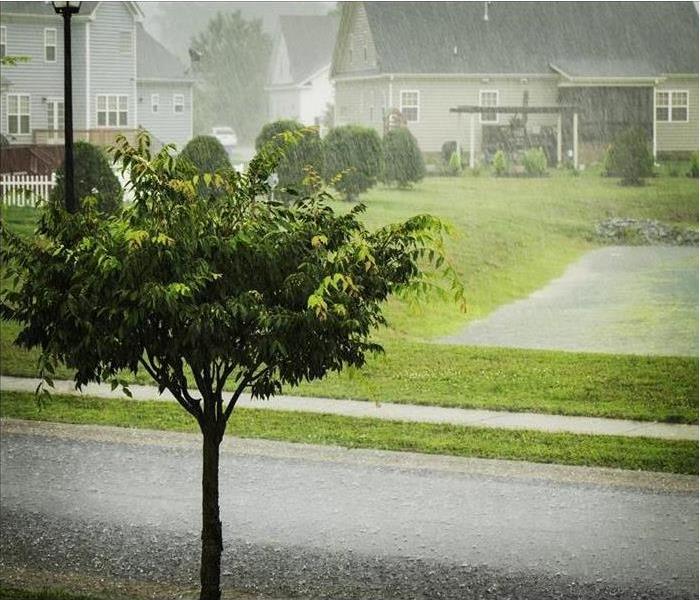 If a storm leaves your home with flood damage, call SERVPRO for professional water removal services.
If a storm leaves your home with flood damage, call SERVPRO for professional water removal services.
Water Damage Is Reduced from Flooding When SERVPRO Is Called for Help
At SERVPRO, we pursue an aggressive strategy of mitigation, meaning we send out crews 24/7 as quickly as possible to respond rapidly to a scene and stop further damage from occurring. Some disasters rely on mitigation more than others, and flood damage is one of the more significant mitigation topics. We urge homeowners who have fallen victim to a flood to contact us as soon as possible, as a speedy response makes a big difference in how much time and money the situation ends up costing you.
Stopping Seepage and Penetration
When water floods an area, every nook and cranny are susceptible to significant water damage. If we can't respond quickly to a case of flood damage in the Hickory, Newton, or Conover areas, water will begin to work its way through cracks and corners into deeper regions of your home. In the worst cases, when the homeowner is away or unaware of the damage, it can even seep into and damage the building foundation.
Preventing Mold Growth and Further Infection
Floodwaters breed mold, fungi, and present an environment for insects and microbes to expand in great numbers quickly. Early removal of floodwater is critical in stopping the growth and reproduction of these unwanted consequences. We will also need to initiate a thorough drying process to free the area from mold's grip, and pumping out water quickly is a vital first step to diminishing these effects.
Keeping Conditions Under Control
Floods tend to open up areas to conditions that propagate further damage to the home, manipulating factors such as temperature, humidity, and air flow in the home. If we can respond quickly enough, we can set up equipment to control these variables before the flood ever gets a chance to disrupt the internal elements of the structure.
SERVPRO of Alexander, Burke, Caldwell & Catawba Counties employs a strategy of mitigation to help prevent as much damage as possible to your home in the event of a disaster. If your home has been flooded, call us right away 24/7 at (828) 396-1070 so that we can respond quickly and begin to mitigate damage.
SERVPRO Helps Reduce Water Damage from Storms and Floods
6/20/2022 (Permalink)
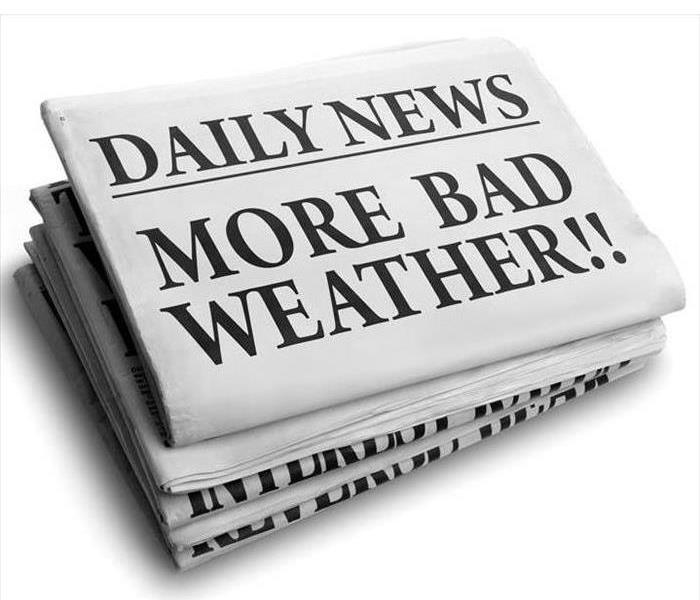 Be Prepared For Storm Damage in the Hickory area!
Be Prepared For Storm Damage in the Hickory area!
At SERVPRO, we pursue an aggressive strategy of mitigation, meaning we send out crews 24/7 as quickly as possible to respond rapidly to a scene and stop further damage from occurring. Some disasters rely on mitigation more than others, and flood damage is one of the more significant mitigation topics. We urge homeowners who have fallen victim to a flood to contact us as soon as possible, as a speedy response makes a big difference in how much time and money the situation ends up costing you.
Stopping Seepage and Penetration
When water floods an area, every nook and cranny are susceptible to significant water damage. If we can't respond quickly to a case of flood damage in Taylorsville, water will begin to work its way through cracks and corners into deeper regions of your home. In the worst cases, when the homeowner is away or unaware of the damage, it can even seep into and damage the building foundation.
Keeping Conditions Under Control
Floods tend to open up areas to conditions that propagate further damage to the home, manipulating factors such as temperature, humidity, and air flow in the home. If we can respond quickly enough, we can set up equipment to control these variables before the flood ever gets a chance to disrupt the internal elements of the structure.
SERVPRO of Alexander, Burke, Caldwell and Catawba Counties employs a strategy of mitigation to help prevent as much damage as possible to your home in the event of a disaster. If your home has been flooded, call us right away 24/7 at (828) 396-1070 so that we can respond quickly and begin to mitigate damage.
4 Types of Storms We Have in Catawba County
1/18/2022 (Permalink)
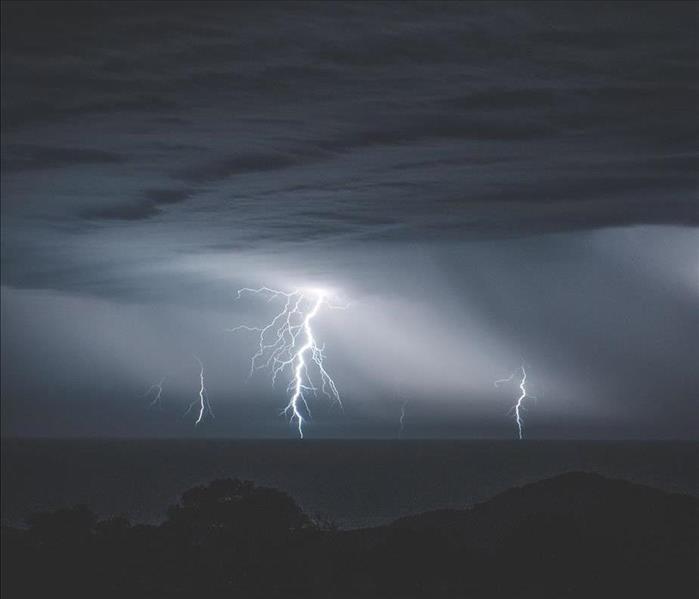 Storms affect hundreds of local homes each year, so prepare now!
Storms affect hundreds of local homes each year, so prepare now!
Each year, bad weather damages hundreds of homes and businesses in the Hickory, NC area. These incidents can cause broken windows, damaged roofs, water damage, and more, which is why our team is often called to clean up the mess. At SERVPRO of Alexander, Caldwell, Burke and Catawba Counties, we’ve seen first-hand how destructive the weather can be, so if you’re trying to prepare your property for potential storm damage, here are some storms you should be ready for.
Common Types of Storms in Our Area
1. Thunderstorms. Typically a summertime phenomenon, thunderstorms—while usually mild—can cause a lot of damage, such as downed trees, heavy rains, and even start fires.
2. Hurricanes. Hurricanes generally occur in the second half of the year, and they can be quite destructive, such as Hurricane Florence. We don’t usually sustain as much damage as the coastal region, but we still often feel the effects in the form of rain and wind.
3. Tornadoes. Tornadoes aren’t a frequent occurrence in the region, but they aren’t uncommon, either. Unfortunately, they are highly destructive and can cause tree damage and expose homes to the elements.
4. Winter Storms. Each year, we typically get one or two winter storms, such as snow, sleet, or some type of wintery mix. They might be pretty, but they can create problems such as collapsed roofs and burst pipes.
Cleaning Up Storm Damages
Storms can cause a significant amount of damage, but if you’re aware of the potential dangers, you can take preventative steps. If you’re not sure where to start, Ready.gov has a dedicated page for each of these phenomena. But if you do suffer from storm damage, you can call us at (828) 396-1070 to make it “Like it never even happened.”
3 Storm Preparation Tips
11/16/2021 (Permalink)
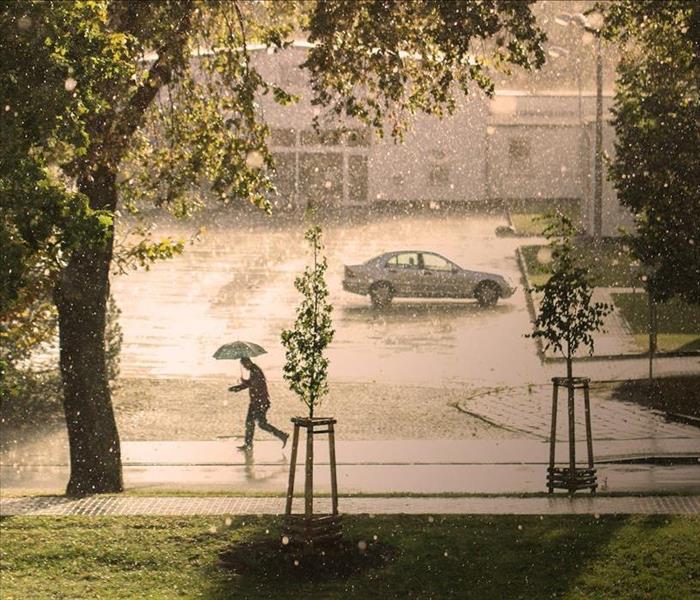 Storm events happen multiple times a year, so take steps to prepare now!
Storm events happen multiple times a year, so take steps to prepare now!
Each year, weather events damage homes in our local community. In the last two years, for example, we had periods of flooding, and in 2018, we had bad freezes, the outer bands of Hurricane Florence, and heavy snowfall. We also had tornado damage in Hickory near the end of 2017. These events usually result in numerous homes and businesses suffering from some sort of storm damage. Because you never know how these storms will play out, it’s important you take steps to prepare in advance.
How to Prepare for A Storm Event
1. Always have a fully stocked emergency preparedness kit. An emergency preparedness kit is an essential tool for any type of disaster. Your kit may include several things, but there are usually staple items, such as a First-Aid kit, food, and water. For a full checklist, we recommend you visit Ready.org.
2. Prepare your home for potential damage. Each type of storm brings its own set of threats. An ice storm encourages pipes to freeze and burst. Hurricanes and tornadoes can down trees and turn unsecured objects into dangerous projectiles. Once you know what kind of storm you have, visit Ready.org to learn the types of damages you can expect, as well as how you can prepare.
3. Track the storm. It’s always a good idea to know when and where a storm is going to strike. Not only does this give you a timeline, but it can also help you understand the potential impact and whether you need to evacuate. Today’s phones will alert you of impending weather threats, but periodically checking on your local weather station can give you ample time to prepare.
When You Need Storm Professionals
Because storms can be destructive, they involve a lot of preparation. But if your Hickory, NC home or business does have storm damage, we’re your local disaster restoration company. Our IICRC-certified technicians can clean up after flooding, burst pipes, and more, so if you need help, call SERVPRO of Alexander, Caldwell, Burke and Catawba Counties!
Understanding Flash Floods
9/21/2021 (Permalink)
 Creeks and other bodies of water can quickly overflow, causing flash flooding to local homes.
Creeks and other bodies of water can quickly overflow, causing flash flooding to local homes.
Flooding can be a major problem, even here in the Unifour area. If that seems unlikely, recall that both Caldwell & Catawba Counties declared a state of emergencies due to flooding for the past two years. Because these incidents don’t happen very often, we’ve discovered many aren’t aware of how destructive flooding can be, or, in the case of flash flooding, how fast it can occur.
What is a Flash Flood?
While flooding can gradually occur over a long period of rain, it can also happen very quickly. Known as a flash flood, this type of flooding occurs within 6 hours of rainfall, but according to the National Weather Service, it often happens in as quickly as 3 hours. This type of natural disaster can happen anywhere — in a creek, your neighborhood, or even the main roads.
Driving & Flash Floods
Flash floods are a major problem when it comes to roadways, and they are responsible for many accidents. These waters are unpredictable, which is why it’s strongly recommended that you avoid driving when a flash flood warning is issued. So be sure to adhere to any warnings, and avoid driving at night, when it’s harder to see flooding.
Being Aware of Weather Events
Weather can cause a lot of damage to both you and your property. In fact, during each of the last few flood events, we received more than 300 calls from customers who had damage to their homes. While not all disasters can be avoided, having advance warnings can help you mitigate the effects. That’s why it’s important to regularly keep up with weather news, such as on Ray’s Weather. If you do have a disaster, though, be sure to call our professionally trained team here at SERVPRO of Alexander, Caldwell, Burke and Catawba Counties to make it “Like it never even happened.”
The Flood Cleanup Process
9/7/2021 (Permalink)
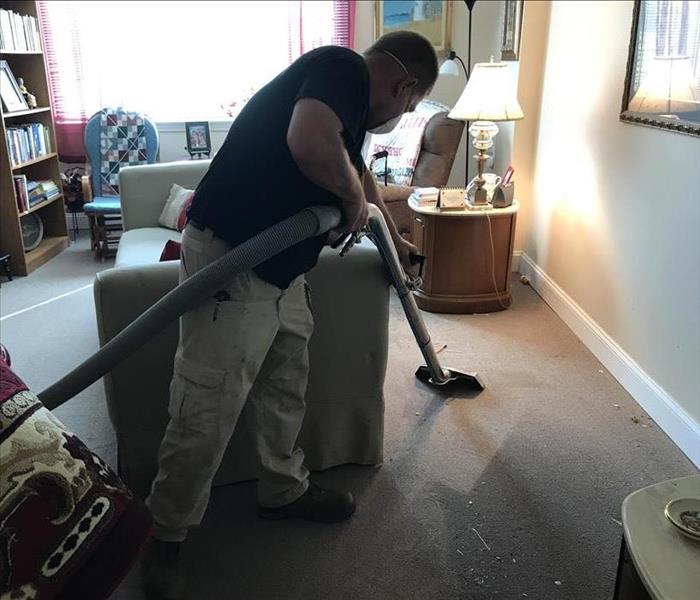 We extracted water in this Lenoir, NC apartment building after it had flooding.
We extracted water in this Lenoir, NC apartment building after it had flooding.
Flooding can happen to anyone for a number of reasons. Storms, for example, can cause heavy rains to infiltrate your home. Frozen pipes are another problem because they can burst as they thaw. Regardless of how it happens, flooding can cause significant damage to your home — and that’s not even considering the eventual mold growth. Fortunately, disaster restoration professionals such as SERVPRO of Alexander, Caldwell, Burke and Catawba Counties in Lenoir, NC can clean up and restore flooded properties using an industry-standard process!
Step 1: Assessing the Damage
Once our crews arrive on the scene, their priority is to assess the damage. They’ll need to identify the cause of the incident, make sure it’s addressed, and identify which rooms have been affected. At this point, they will also get initial moisture level readings. All of this information is essential for our team to develop a customized game plan for your home or business.
Step 2: Extract the Water
Once our crew has finished assessing the damage, they’ll start extracting the water. We have different extraction machines — both truck-mounted and portable — that can suck up large volumes of water from carpet and other types of flooring. Once we’ve removed all standing water, we’ll begin drying out your property!
Step 3: Drying Out Your Home
Once the excess water has been extracted, we’ll set out air movers and dehumidifiers to dry out your home. These machines work collaboratively by pulling moisture into the air and then cooling it and converting it back into water — this time into a controlled container! This process exponentially speeds up the drying process, which can prevent structural damage and lowers the risk of mold growth.
Step 4: Cleaning Your Belongings
Your belongings have sentimental value, which is why we do everything we can to protect them. Our team will remove all furniture and other possessions from affected rooms and safely transport them back to our warehouse to be cleaned and stored. If items have been completely ruined and cannot be salvaged, we will properly dispose of them — always with your permission!
Step 5: Restoring Your Home
Once the drying process is complete, our technicians will remove the equipment! If you also decide to use us for the repairs, our reconstruction team will assess the damage, provide a quote, and then begin the final step of the process. And of course, we’ll return all of your salvageable possessions—cleaned and restored!
Your Local Disaster Restoration Team
SERVPRO of Alexander, Caldwell, Burke and Catawba County has helped thousands of homes and businesses recover from disaster since we opened our doors in 2009. We’ve seen how devastating floods can be, but we’ve also seen how homes can be cleaned and restored. If you have flooding at your Lenoir, NC property, call our team today!
3 Steps You Can Take to Prevent Rain Damage in Hickory, NC
7/27/2021 (Permalink)
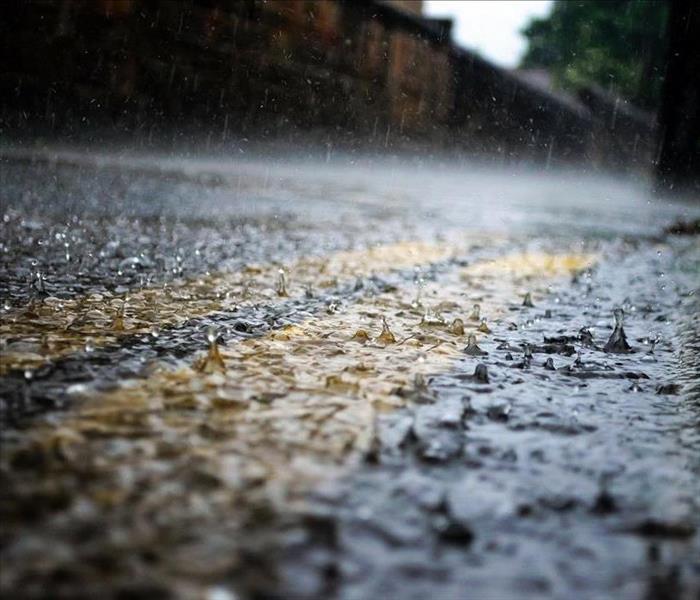 Rain can cause a lot of damage, but you can take steps to prevent it!
Rain can cause a lot of damage, but you can take steps to prevent it!
Rain is great for our grass and plants, but it can be problematic for our homes. Each year, rain causes flooding and other damages in homes in Hickory, NC and the surrounding areas. While there’s nothing we can do to stop the precipitation, there are at least 3 steps you can take to prevent damage to your home.
How to Prevent Rain Damages
1. Regularly clean your gutters. We get it—nobody likes to clean their gutters, but they’re not just for decoration. This important system redirects rain away from your home and prevents it from pooling. Fallen leaves, bird nests, and other debris can cause blockage, which can ultimately result in leakage or other complications.
2. Grade your yard away from your home. Your yard should be sloped away from your home; otherwise, gravity will redirect rainwater back to your property. This is especially problematic for homes with basements, but this can affect any home. If you aren’t familiar with grading, it’s always best to hire a landscape professional.
3. Install and maintain a sump pump. Basements tend to be the most susceptible to flooding, but a sump pump can mitigate the damages. This device is installed into the floor of your basement, where it captures and redirects water away from your home. As long as it's maintained, it can save you the headache!
Your Flood Professionals
Rain might be nice to watch from your back porch, but it can lead to unwanted water damages. If rainwater does disrupt your peace, you’ll want a water damage cleanup company to clean up the mess. Fortunately, SERVPRO of Alexander, Caldwell, Burk and Catawba Counties is available 24/7 to serve the Hickory, NC community!
3 Digital Resources for Storm Events in Newton, NC
6/22/2021 (Permalink)
 When there's a storm event, there are several online resources to check!
When there's a storm event, there are several online resources to check!
In the age of information, there are thousands of resources available at your fingertips; conversely, that means there are thousands of resources to sift through. At SERVPRO of Alexander, Caldwell, Burke and Catawba Counties, we've seen how storms have caused significant damages to homes in the Newton, NC community, and it’s not always obvious where to look when you need help. That’s why we’re providing 3 of the top online resources for nearly any weather event.
Where to Find Help and Information
1. National Weather Service. The National Weather Service is a government agency that provides weather forecasts, warnings, and other related information to organizations and people across the nation. Their website offers in-depth information and forecasts for any region, including our own here in Newton. If you’re looking for reliable weather updates, this is the place to go.
2. FEMA. The Federal Emergency Management Agency is responsible for helping people before, during, and after disasters. Their website is particularly great if you are looking for information on dealing with many different types of disasters, such as flooding or hurricanes. If you are eligible for federal assistance, you can also visit their site for more information.
3. Catawba County Government. When Catawba County declares a state of emergency, they put all relevant information on their website. In fact, residents were able to file claims if they needed assistance. If there’s any kind of major event, be sure to check their site for news and updates.
Storm Damage Professionals Serving Newton, NC
If there’s a storm event, it’s a great idea to get information from sites you can trust. And if you need cleanup and restoration services, that site is here at SERVPRO of Alexander, Caldwell, Burke and Catawba Counties. We’re available 24/7, so call us anytime at (828) 396-1070!
3 Ways to Prepare for Winter Storms in Hickory, NC
1/19/2021 (Permalink)
 Winter can be a beautiful season, but it also brings potential danger. Always be prepared for the worst!
Winter can be a beautiful season, but it also brings potential danger. Always be prepared for the worst!
Winter brings a sense of wonder and enjoyment. It also brings freezing temperatures, snow, and ice storms. Although many of us look forward to seeing some precipitation this time of year, winter storms can cause damage to you and your Hickory home.
Each year, these events bring down trees, increase the number of car accidents, and result in several water damages. Fortunately, you can take some preventative steps and still enjoy the winter season.
How to Prepare
1. Insulate your pipes. When temperatures drop below freezing, your pipes are at risk of freezing. When the ice begins to thaw, the increased pressure often causes these pipes to burst. To help avoid such an incident, ensure your pipes are well-insulated, especially if they are exposed!
2. Equip your vehicle with an emergency kit. We strongly advise that you keep off the roads when conditions are poor, but sometimes you just can’t help it. In any case, pack your vehicle with an emergency kit in the event you get stuck or injured. Prepare a blanket, a first-aid kit, and even some food!
3. Check your home’s structure. When snow and ice melt, they transition back into water. Unfortunately, if there are cracks or any other deficiencies in your home’s structure, that can lead to intrusion. This relatively slow leak can lead to long-term structural damage in the form of mold growth. In preparation, have your home’s structure inspected, and have any known issues addressed!
Storm and Water Damage Professionals in Hickory, NC
While we hope you have fun this winter, taking some time to prepare can go a long way in the future. If you do have water damage, however, know that our team is available to serve the Hickory community 24/7!
3 Ways to Keep Your Hickory Basement Safe from Flood Damages
10/27/2020 (Permalink)
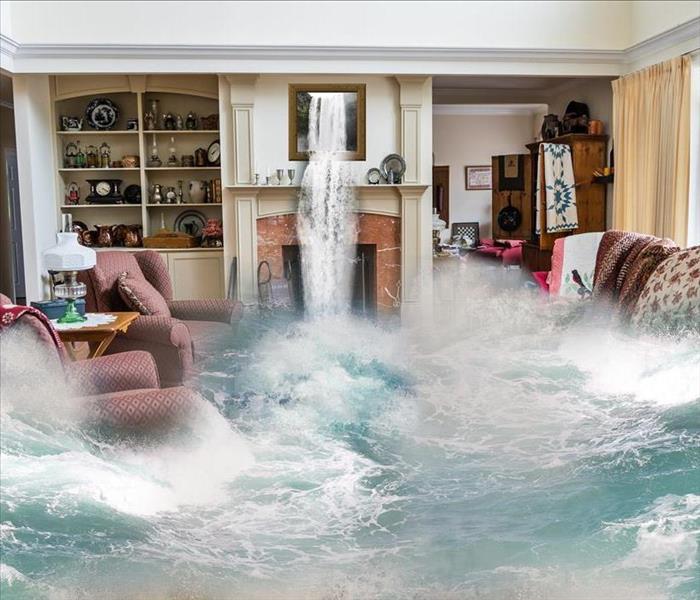 Heavy rains can flood your basement and damage your belongings. If your Hickory home has a basement, be sure to take steps to keep it safe!
Heavy rains can flood your basement and damage your belongings. If your Hickory home has a basement, be sure to take steps to keep it safe!
Every year, hundreds of local homeowners have flooded basements and other significant damages. Furniture and belongings are ruined, mold begins to grow, and they have potentially gallons of water to remove. Many Hickory homes have basements, so it’s important to understand how you can keep your basement safe when it floods.
Install a Sump Pump
There are several precautions you can take to prevent flooding in the first place, but it’s a good idea to have a backup plan in place. This is where a sump pump comes in handy. A sump pump is a machine that traps water into a basin and redirects it away from your home. If you have a basement, it’s practically an essential tool for mitigating water damage. It does require routine maintenance, so make sure it's ready when you need it!
Keep Belongings Off the Floor
If your basement floods, furniture and other possessions are at risk of being damaged. You can avoid this by keeping them off the floor at all times. Place items on shelves and skids, and use pads to keep furniture from touching the ground. Now if you do have flooding, you're likely to have minimal damages.
Keep Your Gutters Clean
Perhaps one of the simplest ways you can help prevent flood damages is to keep your gutters clean. Your gutters act as your first line of defense against flooding, so keeping the lines clear will keep them functioning. Otherwise, water can pool around your home and seep into your basement. They should be cleaned at least twice a year—in the spring and in the fall.
Overcoming a Flood Incident in Hickory, NC
If your basement floods, the last thing you should do is panic. While it’s a stressful situation, you have local professionals who can help you clean it up. SERVPRO of Alexander, Caldwell, Burke, and Catawba Counties has helped hundreds of flood victims reclaim their Hickory, NC homes. If you do have flooding, you can call us any time at (828) 396-1070!
3 Ways You Can Help Prevent Flooding
9/8/2020 (Permalink)
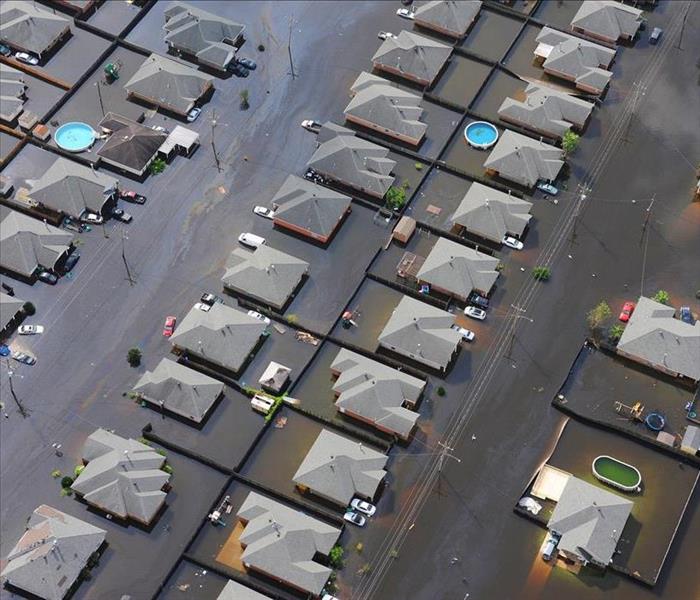 Flooding can cause signficiant damage, but there are some steps you can take to minimize your risk.
Flooding can cause signficiant damage, but there are some steps you can take to minimize your risk.
Our community has had a lot of rain in the past few weeks, which has caused several Hickory homes to have flooding incidents. While SERVPRO of Alexander, Caldwell, Burke and Catawba Counties is available 24/7 to clean up these disasters, it’s always a good thing if you can avoid them altogether. There is no definite way to prevent flood damage, but there are a few steps you can take to mitigate your home’s risk.
Flood Damage Prevention
- Make sure your gutters are clean. Your home’s gutters are your first line of defense against flooding, but only if they are clear of obstructions. Be sure to clean them on a regular basis as they direct water away from your home!
- Identify and seal cracks in the foundation. If your Hickory home has cracks or crevices, rain will find a way into the interior. Check for these issues during your annual maintenance inspection and have them sealed before it rains and leads to water damage.
- Grade the lawn away from your home. The last thing you want is for rain to pool on the edges of your home, but if your yard isn’t graded properly, this may happen. The next time it rains, identify areas where water collects and then have your yard professionally graded so that it leads away from your home.
Cleaning Up Storm Damages
There’s no way to control the weather, but there are steps you can take to reduce your risk of having flooding. If you do have water damage, however, know that SERVPRO of Alexander, Caldwell, Burke and Catawba Counties is always available to clean up and restore your property.
3 Ways to Mitigate Wind Damage
8/25/2020 (Permalink)
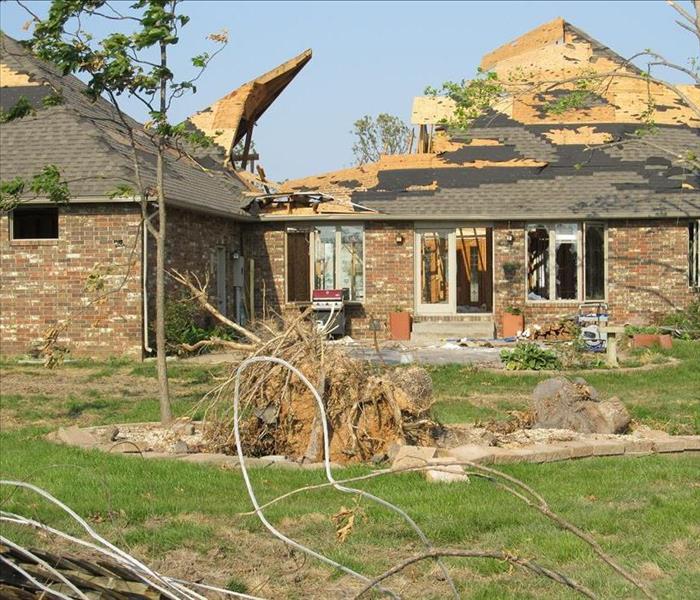 Wind damage can vary in strength, but if you take precautions, you can mitigate its impact on your home.
Wind damage can vary in strength, but if you take precautions, you can mitigate its impact on your home.
After nearly every storm event in our area, we get calls from customers whose homes have wind and water damage. Even mild storms can cause destruction if the conditions are right but fortunately, there are a few steps you can take to mitigate your home’s risk of having wind damage. SERVPRO of Alexander, Caldwell, Burke and Catawba Counties has served the Hickory, NC area for more than a decade, so here are some tips we've learned along the way.
How to Prevent Wind Damage
- Remove trees close to your property. Storms and downed trees go hand-in-hand, but that doesn’t mean your home needs to be at risk. If you have any trees within range of our house, consider having them trimmed or removed — especially if they are sick or dead.
- Secure or remove furniture and debris in your yard. Nearly any unsecured object — including furniture, toys, and debris — on your property can be transformed into a projectile. Either fasten these objects or have them temporarily relocated into your home until the storm passes.
- Install storm shutters. Even if you completed the above steps, there’s still a possibility something could smash into your windows and cause damage inside your home. Professionally installed storm shutters are an excellent way to prevent this potential damage.
Wind Damage Cleanup Professionals
While there are several ways you can mitigate your home’s risk of having wind damage, there’s no sure way to prevent it completely. Fortunately, if you do have damage, our team at SERVPRO of Alexander, Caldwell, Burke and Catawba Counties is always available to clean and restore your property. We’re available 24/7, so give us a call at (828) 396-1070!
What You Need to Know About Flood Insurance
7/14/2020 (Permalink)
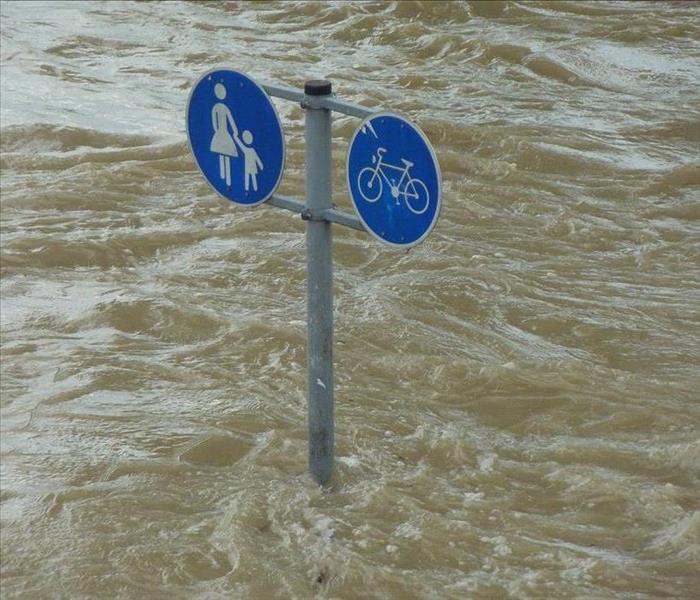 Flooding can be quite destructive, but flood insurance can help you mitigate the overall cleanup and restoration costs!
Flooding can be quite destructive, but flood insurance can help you mitigate the overall cleanup and restoration costs!
Flood damages aren’t as rare in Lenoir as they might seem. Back in both June 2019 and February of this year, we had two major storm events that caused flooding here and in surrounding communities. In both events, our team at SERVPRO of Alexander, Caldwell, Burke and Catawba Counties received hundreds of calls from customers whose homes or businesses had been overwhelmed by rain.
Unfortunately, most of these callers didn’t have flood insurance; many didn’t even know they needed it. Without flood insurance, you’re fully responsible for cleanup and restoration costs — an expense that could easily go into the thousands. But if you’ve never had or heard of flood insurance, there are some things you should know.
Waiting Period
With many types of insurance, you can expect coverage to start almost immediately after you purchase it (barring certain exceptions). Flood insurance isn’t one of them. In almost all cases, there's a waiting period before your flood insurance coverage kicks in. This is mainly to prevent people from refusing to buy it until a storm is on the way.
If you purchase flood insurance through the National Flood Insurance Program (NFIP), there's usually a 30-day waiting period. Private insurance policies, on the other hand, may only make you wait as little as 14 days.
Regardless, if you’re thinking about buying a policy, it’s best to go ahead and do it. Otherwise, you may still be on the hook for the damages.
Flood Insurance is for Everyone
A common misconception is that only people living in designated flood zones need to buy flood insurance. After all, if you don’t live in a flood zone, you can’t have flooding, right?
Unfortunately, that’s not the case. Many of the calls we received during the two recent flood events were from customers who didn’t live in a flood zone. Heavy rains, faulty sump pumps, and even structural damages can all lead to flooding no matter where your property is located. So before you write it off as unnecessary, consider getting flood insurance, just in case.
Recovering from Flood Damages
Flood insurance will help you keep your out-of-pocket expenses to a minimum, but if you have flooding, you’ll still need to hire a cleanup and restoration company. Since 2009, SERVPRO of Alexander, Caldwell, Burke and Catawba Counties has helped thousands of homes and businesses recover from fire and water disasters. We’re available 24/7 to clean up and restore flood damages, so call us today at (828) 396-1070!
Tornado Watch vs Tornado Warning
6/8/2020 (Permalink)
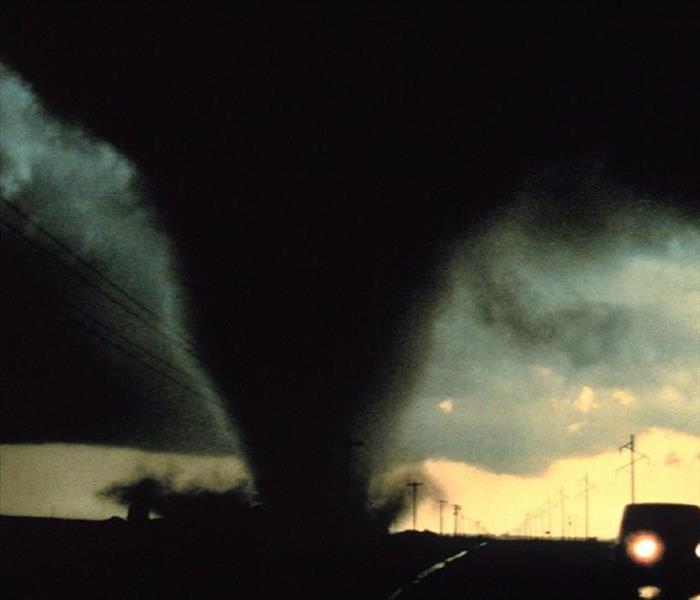 Tornadoes are extremely dangerous, so you should follow local advisories!
Tornadoes are extremely dangerous, so you should follow local advisories!
Meteorologists use a lot of different terms to describe weather patterns and conditions. In many cases, however, these terms convey important safety information to local audiences. As we approach summer, we might hear more about tornadoes and other storm systems. That’s why it’s important you know the difference between a “tornado watch” and a “tornado warning.”
Tornado Watch
Authorities issue a tornado watch when conditions are right for a tornado to form. While there isn’t an imminent threat in this situation, the conditions could worsen. In any event, when a tornado watch is issued, move indoors and keep an eye on the local news for updates.
Tornado Warning
A tornado warning is a more urgent alert that's only issued when a tornado has actually been spotted or when one is imminent. When this has been issued, you should move to a safe place in your home or shelter and wait there until it’s been deemed safe to do so.
Your Disaster Cleanup Professionals
Tornadoes are extremely powerful storms, so even if you and your family are safe, your home may not be. Fortunately, if you do have storm damage, SERVPRO of Alexander, Caldwell, Burke and Catawba Counties is available 24/7 to clean up and restore your home!
How to Protect Your Hickory Home from Melting Snow
2/6/2020 (Permalink)
 Snow is pretty, but it can cause problems once it melts.
Snow is pretty, but it can cause problems once it melts.
Snow brings a sense of wonder and excitement. While you and your children may look forward to a winter wonderland, as with any weather event, snow isn't without its potential dangers. If you don’t take the necessary precautions, you may end up with water damage or worse. Fortunately, there’s a couple of things you can do to mitigate the risk of melting snow, and as your local restoration professionals, our team at SERVPRO of Alexander, Caldwell, Burke and Catawba Counties has some tips!
Avoid Melting Snow
- Ensure your gutters are cleaned out. You may not be excited about cleaning your gutters, but they serve as the first line of defense against water damage. When snow begins to melt, the resulting water can quickly pool up and invade your home. Your gutters can redirect the water and protect your property.
- Repair cracks and structural issues. Melted snow can also enter your home through cracks and other weaknesses in your home’s structure, which can lead to mold growth and further complications. If you know of any issues, you should have them addressed immediately. Even if you don’t know of any issues, we encourage you to inspect your home anyways.
Storm Cleanup Services in Hickory, NC
You should be able to enjoy the winter weather without worrying about water damage, and in most cases, you can. But as always, we encourage you to do the above and prepare your home for any type of storm event. If you do have damage, though, know that SERVPRO of Alexander, Caldwell, Burke and Catawba Counties is always here to help!
What to Do If Your Frozen Pipes Burst
12/23/2019 (Permalink)
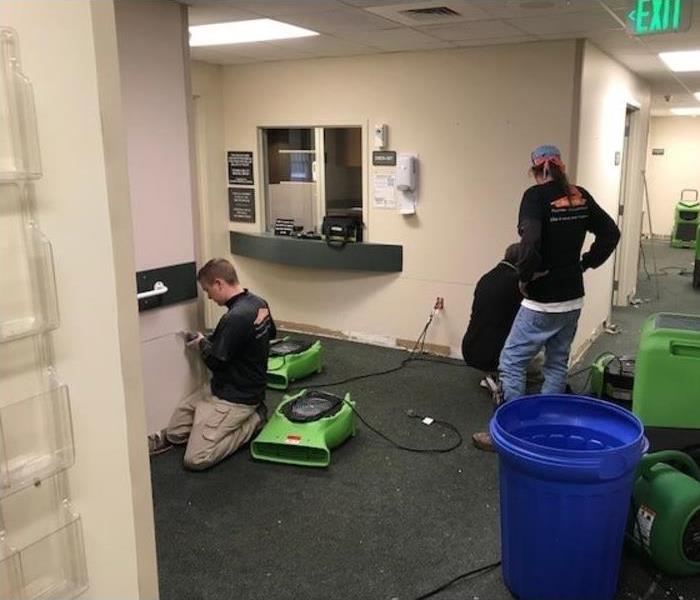 When burst pipes caused water damage to this commercial building, our crew dried it out!
When burst pipes caused water damage to this commercial building, our crew dried it out!
Each winter, we get calls from customers whose pipes have frozen and burst. When temperatures drop below freezing, water freezes and expands, which builds up pressure in the plumbing system. And when the pipes begin to thaw, this added pressure can cause the pipes to burst, sending gallons of water into your home. These incidents are certainly stressful, but a few simple steps can help you navigate the situation more successfully.
- Turn off the water. First, you’re going to need to stop the water from gushing into your home. Locate the water shut-off valve in your home and shut the water off. This won’t undo the damage, but it stops it from getting any worse.
- Call a plumber. Now you’re going to need to fix the source of the issue. A plumber will fix the pipe damage, plus they can identify other issues you might not have yet noticed. If nothing else, you’ll need them so you can turn your back on.
- Call a disaster restoration company. Finally, you’re going to need the water damage cleaned up. A good disaster restoration company will assess the damage, extract the water, and set equipment to accelerate the drying process. When you’re looking for a company in your area, we highly recommend you find one that’s IICRC-certified!
It’s never fun to discover your pipes are frozen, but if they do burst, the above steps should put you in a good position. If you need a disaster restoration company to clean your home’s water damage, know that our team is available 24/7 and is an IICRC-certified firm!
What To Do if a Tree Falls On Your Roof
11/24/2019 (Permalink)
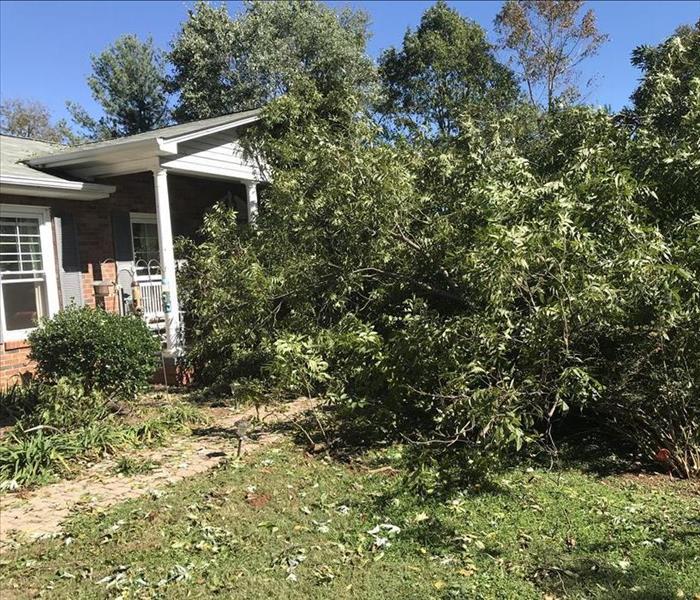 This tree fell during a storm and damaged part of the front of this house!
This tree fell during a storm and damaged part of the front of this house!
When a tree falls on your roof, it causes two problems: it damages your home’s structure, and it exposes your home to the elements. Each year, we get dozens of calls from people who have had trees fall on their roof and are unsure of what to do. It’s not a quick process, but there are a few steps you can take!
- Remove the tree. This might seem like an obvious first step, but we’ve had countless calls from people who haven’t even removed the tree. Until the damaged area of your roof has been cleared, it can’t be covered. We recommend calling your local tree removal company.
- Tarp exposed areas. Unless you’re lucky, a fallen tree will likely cause damage to your roof, generally leaving it exposed. To ensure outside elements don’t get in and cause more damage, you should have it tarped. In some cases, the tree removal company will do this for you, but if not, you will need to contact a roofing company.
- Contact a roofing company. Even if the roof is tarped, you’ll need to contact a roofing company to determine the next phase of repairs. After all, the tarp is only a temporary solution!
- Call a disaster restoration company (if applicable). If the tree fell because of a storm (or if a storm hits before the damage can be properly tarped), you’re likely going to have rain damage on the interior of your home. A water mitigation company will dry the affected areas and treat it with an antimicrobial treatment to prevent mold growth!
A fallen tree can cause a lot of damage and headache, but with the above steps, you can get your life back on track. If you have water damage and need a disaster restoration company, our Lenoir-based team is available 24/7 to make it “Like it never even happened!”
Our Storm Response Team
9/11/2019 (Permalink)
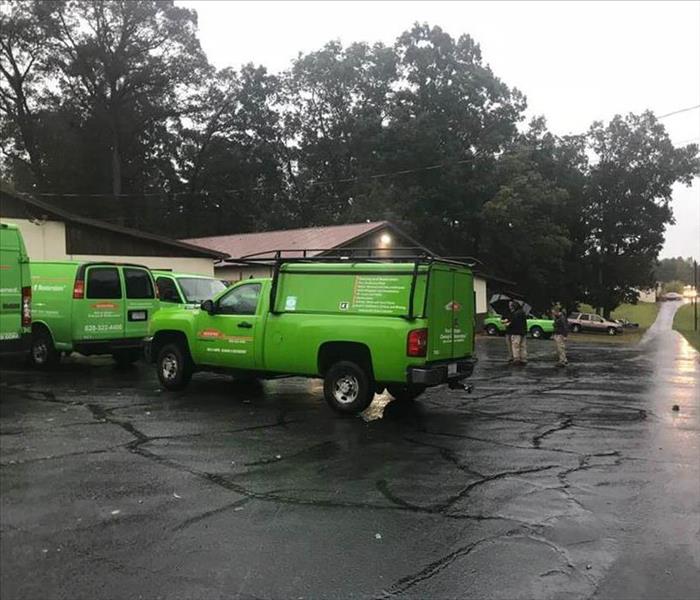 Our team is always ready to help, even if we have to travel!
Our team is always ready to help, even if we have to travel!
A year ago, Hurricane Florence utterly devastated the Carolinas. Last week, Hurricane Dorian struck the areas as well. While it had weakened considerably from its peak as a Category 5 storm, it still caused significant damage. That’s where SERVPRO comes in. Although we primarily service Alexander & Caldwell Counties, our team has and will aid areas affected by catastrophic storm damages.
Why We Help Other Areas
We’ve mentioned in other blog posts that we can handle any size disaster. This is true—in part—because we are a large loss franchise, but it’s also true because we have the support of more than 1,700 other SERVPRO franchises across the nation. Conversely, we also support other franchisees in need, such as those in hurricane-affected areas.
But this isn’t some obligation—our team truly believes in helping others in need. When we announce our plans to travel, many of our employees are eager to volunteer, even knowing they will be in less-than-ideal conditions.
Should We Stay, or Should We Go?
One of the most challenging aspects of responding to storms outside our area is deciding if we should go. Our top priority is to make sure that our local community is taken care of first, so when we are considering a response, we have to take that into consideration.
Fortunately, as our team has grown over the years, it’s been easier to take some of our team without affecting our customers at home. In some cases, we will hire temporary workers to assist us with our storm response.
Our Team is Ready
Fortunately, our services were not needed this time, but our team was packed and ready to go. Regardless, we’re here to serve the Lenoir community and surrounding areas, so if you have damages of your own, you can call our team anytime at (828) 396-1070!
2 Things to Know About Flooding
8/12/2019 (Permalink)
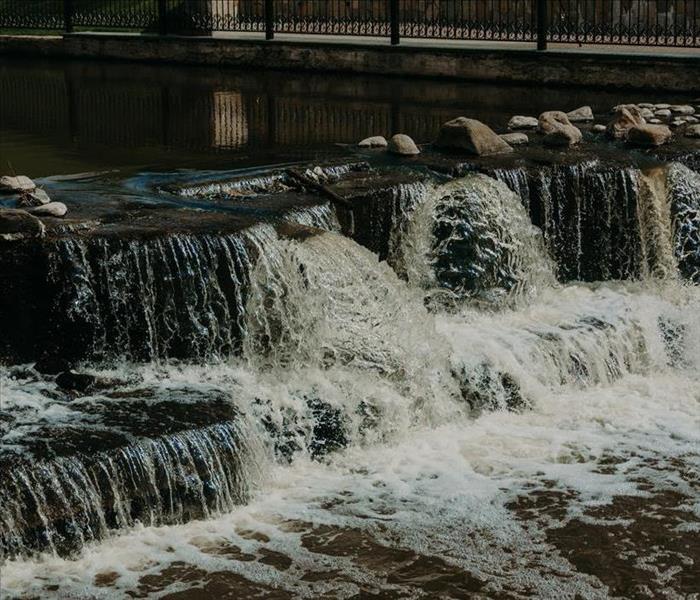 Flood damage isn't covered by your standard homeowner's insurance, so be sure to purchase flood damage!
Flood damage isn't covered by your standard homeowner's insurance, so be sure to purchase flood damage!
Although we don’t have severe flooding very often, it is possible, as we learned back in June. Besides the obvious destruction it causes, we’ve discovered that many of our customers aren’t aware of how floodwaters can be a major problem. In reality, flooding can potentially be one of the most expensive types of disasters your home or business can have.
1. Flood damage is not covered under your standard homeowners’ insurance.
Back during the June flooding, hundreds of customers called us for our services. Unfortunately, flood damages can be costly to clean up and restore, and it quickly became apparent that many homeowners incorrectly assumed their properties were covered under their insurance.
Insurance companies flood policy to protect your home from flood damages, but these are separate from your homeowners’ policy. There’s also a 30-day waiting period for your benefits to kick in, so you can’t buy it a day before you expect to need it. That’s why we highly recommend you call your insurance company and see what flood insurance policies they have available!
2. Floodwaters can be dangerous to your health.
There are 3 categories of water damage; each determined by the health risk it poses to humans. Clean, potable water is classified as Category 1 water damage, grossly unsanitary water (such as water from the septic system) is classified as Category 3 water damage. Damages involving floodwaters are also considered Category 3 water damages.
When our team deals with this type of water damages, we have to take extra precautions to protect our health. For example, we have to wear personal protective equipment (PPE), porous materials must be removed, and those with compromised immune systems must evacuate.
Why is floodwater so dangerous? Because it likely carries sewage and chemicals, which in turn brings a variety of pathogenic agents. It’s never a good idea to underestimate the health risks floodwaters can bring.
Restoring Your Flood-Damaged Property
Despite the dangers that flooding presents, your home or business can be restored. Our team here in Lenoir has 10 years of experience helping customers recover from disaster. If your home has flood damage and you need professional help, call us any time at (828) 396-1070!
Be Prepared for Thunderstorm Damage
7/17/2019 (Permalink)
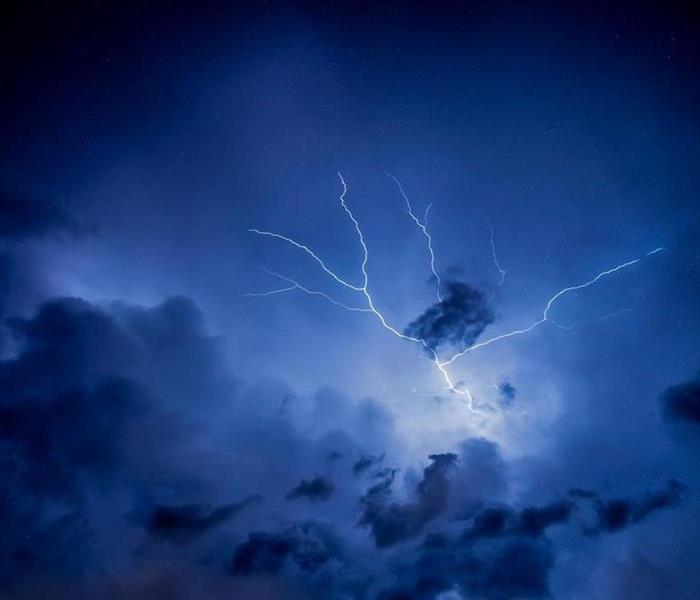 Thunderstorms might look cool from a distance, but they can cause a lot of damage to your home!
Thunderstorms might look cool from a distance, but they can cause a lot of damage to your home!
Summer is a favorite for many people. Vacations, days at the park, s’mores, and more—each cementing a role for the season. But summer is also populated with thunderstorms, which occur more frequently as the weather conditions shift in their favor. Moist, rapidly rising warm air breed these storms, which can cause a number of damages. Because thunderstorms tend to be underestimated, it’s important to know how they can affect you and your home.
Flash Floods
A lot of rain in a short period of time can cause flash flooding. As we all learned last month, most people in the area are susceptible to flooding, even if they aren’t in designated flood zones. These incidents can occur unexpectedly and can close roads or even ruin parts of your home. If you live in an area prone to flooding, it’s a good idea to take precautions if you know a thunderstorm is on the way.
Wind Damage
Dark clouds and strong winds are a sure sign a storm is approaching. Some thunderstorms can even have winds stronger than 50 miles an hour! Of course, storms have been known to knock down trees, which can damage roofs and expose your home to rain. Before a storm arrives, tie down outside objects that could become airborne and—if you act well in advance—cut down sick or dead trees.
Lightning Strikes
Where there’s thunder, there’s lightning. Everyone knows that being struck by lightning can be fatal, but your home can be damaged too. For one, a direct strike to your home can start a fire, though because it often starts in places like the attic, it can go unnoticed until it’s too late. And even if it doesn’t start a fire, if lightning uses your home’s electrical wiring as a path to the ground, it can destroy electrical devices connected to the system.
To prepare, when a storm approaches, stay away from electric devices (and perhaps unplug them) and be wary of any direct hits to your house. You don’t always know there’s a fire until it’s too late!
Your Local Disaster Restoration Company
Storms have the potential to cause a lot of damage to your home. Whether it’s flooding or fire damage, thunderstorms pose a serious threat. Fortunately, our team here in Lenoir are ready and experienced to any property with storm damage, so if your home has storm damage, call our team immediately!
3 Tips for Enduring a Winter Storm
2/6/2019 (Permalink)
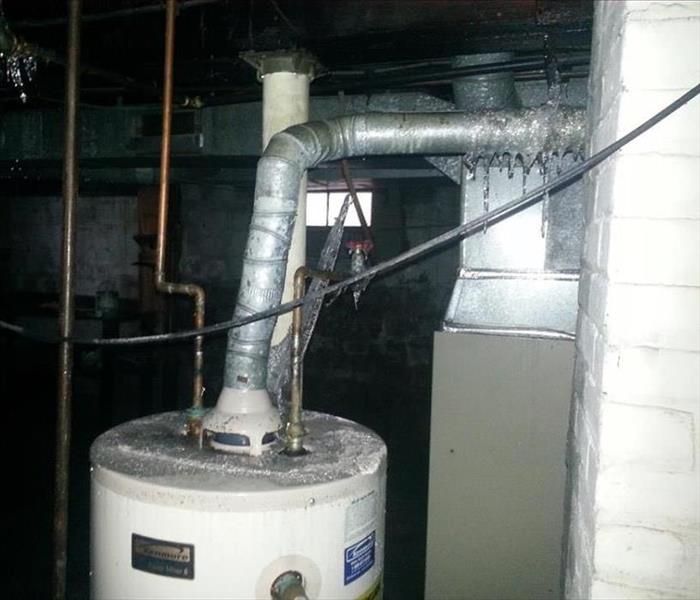 When temperatures drop below freezing, pipes are at risk of freezing and bursting, such as in the image above!
When temperatures drop below freezing, pipes are at risk of freezing and bursting, such as in the image above!
This winter has seemed particularly brutal with its record-breaking snowstorm, below-freezing temperatures, and the occasional ice storms. These events have caused distress and induced damage on properties throughout Alexander and Caldwell Counties. While a winter storm can be disruptive, there are some things you can do to minimize the impact and endure it.
- Assemble an Emergency Survival Kit. You never know how long a storm could keep you cooped up, which is why it’s best to prepare for the worst. Your kit should plan for all sorts of contingencies—lack of heat, power outages, and more. You can find a helpful inventory list on the Center for Disease Control’s official website.
- Stay Off the Roads. In some cases, it might not be feasible to stay home, but if the roads are treacherous, it’s best to stay off the roads. If you must drive, go slow and avoid backroads.
- Be Wary of Frozen Pipes. When temperatures drop below freezing, exposed or poorly insulated pipes are at risk of freezing. Know how to thaw frozen pipes and be prepared to react should they burst. They’re more than just an inconvenience—they can lead to some significant damage.
Although spring is approaching, weather can be relatively unpredictable. In the event of another winter storm, be sure to follow the above tips and be prepared to wait it out. But if your property sustains storm-related damage, you can call SERVPRO of Alexander & Caldwell Counties at any time!
Easy Ways to Prevent Rain Damage
12/28/2018 (Permalink)
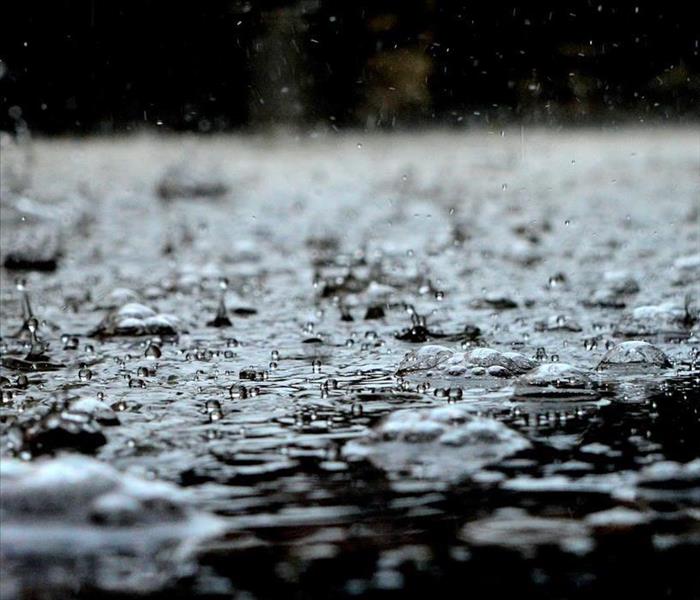 Rain might be a natural part of life, but it can cause a lot of destruction!
Rain might be a natural part of life, but it can cause a lot of destruction!
Rain happens all the time, and while it’s sometimes needed, it can also cause major damage. In fact, we often get calls from home and business owners after a rainstorm because their property has sustained flooding. Fortunately, a little preparation can prevent a lot of damage!
- Clean out your gutters. Your gutters are your first line of defense against flooding, but if they are not cleared, rain can overflow and become a problem. Regular cleanings will help prevent this buildup and allow your gutters to work properly.
- Repair any roof damage. In many instances, rainwater gets in through cracks in the roof, which creates a major problem. If you notice or know of any weaknesses in your roof, have it addressed immediately.
- Ensure your doors and windows are closed. This may seem like one of the most obvious steps you can take, but it’s commonly overlooked. Before a storm arrives, ensure all openings are shut so rain cannot easily enter your home or building.
There are many steps you can take to prevent rain damage, but the steps above are some of the simplest. If you do have flooding from rain, we can make it “Like it never even happened” if you call us today at (828) 396-1070!
3 Types of Damages a Thunderstorm can Cause
12/10/2018 (Permalink)
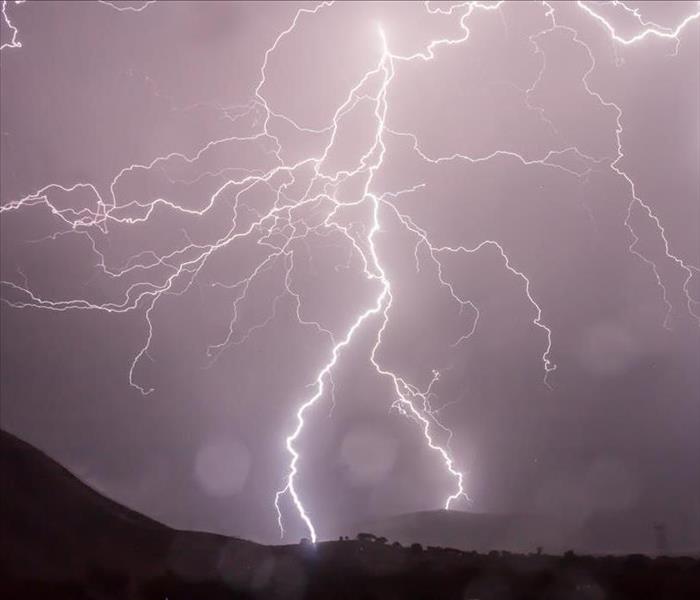 Storms can cause all kinds of damage, but we're here to make it "Like it never even happened!"
Storms can cause all kinds of damage, but we're here to make it "Like it never even happened!"
Thunderstorms—at least in the Lenoir area—are generally pretty mild, and they aren’t often something we worry about. But after most storms, we get calls from customers whose homes have been damaged. That’s why it’s important to understand how a storm can impact your home or business!
- Flooding. One of the most common issues homeowners face after a thunderstorm is flooding. This is often caused by an open door/window, cracks in the structure, or a leak from the roof. It’s important that you regularly inspect your home for places water can intrude and seal them before it ever rains.
- Wind Damage. Depending on the strength of the wind, your property could suffer heavy damages. Make sure that any unrestrained objects or sick/dead trees near your home are removed before the storm ever arrives!
- Fire Damage. Although less likely than the other two, fire damage is still a real possibility during a thunderstorm. Whether due to a power surge due to lightning or some other factor, fires can occur during a storm. If you notice lightning, keep appliances and other devices unplugged unless it’s necessary!
Storms can cause a lot of damage, but preparedness can mitigate the potential impact. If you have storm damage and need a professional to restore your home or business, call SERVPRO of Alexander & Caldwell Counties at (828) 396-1070!
SERVPRO of Alexander & Caldwell Counties Deploys a Storm Response Team
9/21/2018 (Permalink)
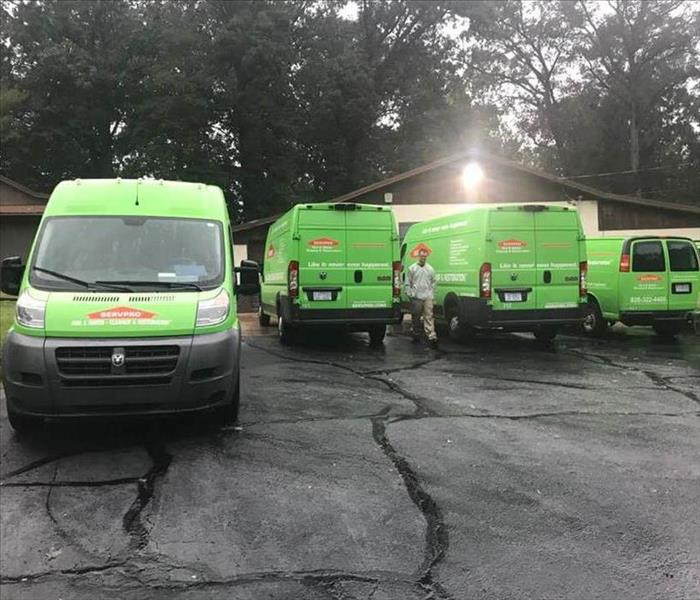 When storms or other major weather events strike, SERVPRO of Alexander & Caldwell Counties is ready to make it "Like it never even happened."
When storms or other major weather events strike, SERVPRO of Alexander & Caldwell Counties is ready to make it "Like it never even happened."
Hurricane Florence doled out major damage to the Carolinas, causing significant flooding and wind damage. As a result, several lives were lost and many have been displaced from their home. In fact, the coastal town of Wilmington was considered an island—largely inaccessible by car. Nevertheless, SERVPRO of Alexander & Caldwell Counties is committed to helping our fellow North Carolinians.
On Sunday, September 20, we deployed an envoy of SERVPRO heroes to Wilmington, NC to assist with cleanup and recovery. Our large loss trailer—which is equipped for such occasions—was fully stocked with air movers, dehumidifiers, a makeshift office, and a generator to power our equipment. Our Storm Response Team will continue to help as Wilmington gets back on its feet.
In the meantime, we’re still fully operational at our Lenoir, NC office to help our local communities should disasters arise. If you need help with fire or water cleanup and restoration, please call SERVPRO of Alexander & Caldwell Counties at 828-396-1070!
5 Essential Items You Will Need to Prepare for Hurricane Florence
9/11/2018 (Permalink)
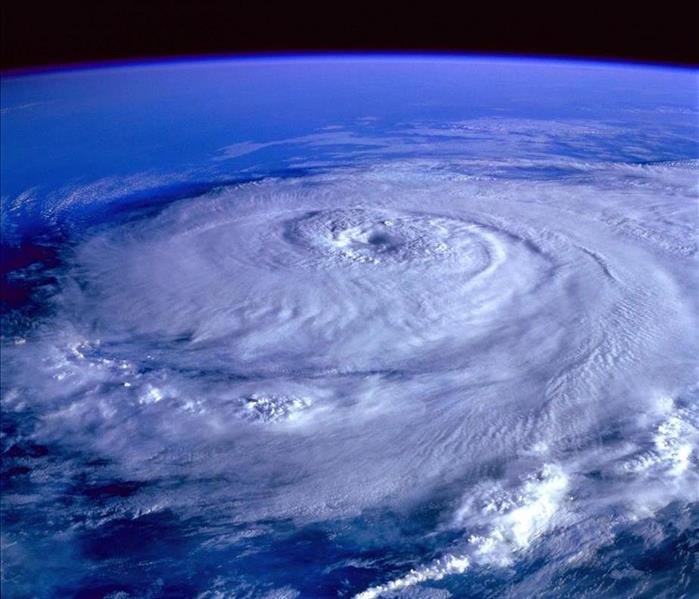 Hurricanes are natural disasters that can cause a significant amount of damage. Don't wait--start preparing for Hurricane Florence now!
Hurricanes are natural disasters that can cause a significant amount of damage. Don't wait--start preparing for Hurricane Florence now!
Hurricane Florence has dominated headlines lately, but that’s no surprise—it’s set to be one of the worst hurricanes on the East Coast in decades. At the time this was written, the storm was classified as a Category 4 and was set to hit North Carolina. While it’s still not certain how much damage the western part of the state will see, officials are saying to prepare for the worst. So if you still haven’t prepared Hurricane Florence, make sure you at least have the 5 items below.
- Water. Whether you’re on well or city water, it’s never a guarantee that you’ll always have running water during a hurricane. It is recommended that you have at least 1 gallon of water per person per day for a minimum of 3 days. (For example, if you have 3 people in your home, you should have at least 9 gallons of water.)
- Non-perishable Food. As with water, it’s never a guarantee that you’ll always have power in your home. That’s why it’s important that you have enough non-perishable food to last for at least 3 days. This includes, but is not limited to, canned meat, crackers, trail mixes, peanut butter, and more!
- Non-electric light source. When the power goes out—especially at night—you’re going to wish you could see. Some options include candles, flashlights, and battery-powered lanterns. Just be sure that you have the items to fuel them (either batteries or matches).
- First-Aid Kit. When wind and road conditions begin to deteriorate, it will be important that you stay indoors. But when there is an injury or accident, you’ll want to be able to react. In addition to bandages, your kit should also include sterilizing pads, antiseptics, hand sanitizer, necessary medication, and more!
- Battery-powered TV or Radio. We now rely on our phones to remain connected with the world, but when the power goes out and cell towers are damaged, you won’t have any way of remaining current with formal weather updates. That’s when a battery-powered TV or radio becomes essential. Just make sure you’ve bought enough batteries!
The jury’s still out on what kind of damage Hurricane Florence will cause in Lenoir and other areas of western North Carolina, but there’s no reason why you cannot start preparing now. After all, they say an ounce of preparation produces a pound of cure!
What’s the Difference: Flood Warning vs. Flood Watch
8/31/2018 (Permalink)
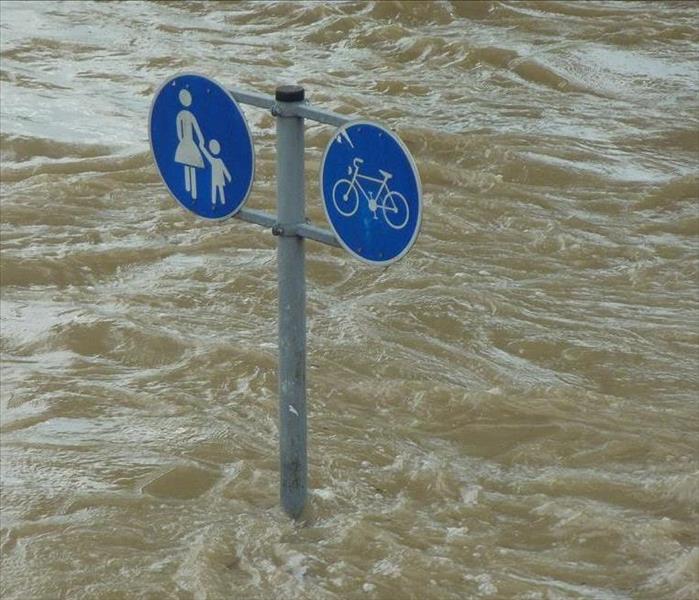 Knowing the difference between a flood watch and a flood warning will let you know when you need to prepare versus taking action!
Knowing the difference between a flood watch and a flood warning will let you know when you need to prepare versus taking action!
When there are heavy rains in our area, we might hear the words “flood warning” or “flood watch.” For many of us, either phrase tells us that we need to be alert to flooding. But did you know that there’s a significant difference between a “warning” and a “watch?”
Flood Watch
A flood watch is an alert that indicates the conditions are right for flooding to happen. However, it does not mean that flooding will necessarily occur. When you see this alert, you should prepare for flooding since it is a strong possibility. Monitor the local news or other reliable sources for updates.
Flood Warning
A flood warning is announced when flooding is either impending or already occurring. When you get this alert, you should take immediate action and monitor official channels to get updates on the condition. If you’re unsure what to do during a flood, check out the resources at Ready.gov!
Monitor News or Radio Stations
Because weather can be unpredictable, always keep an eye on your local news or radio stations. Many of them will also have apps or websites that offer real-time updates. As long as you are familiar with the phrases they use, you’ll be able to act accordingly when they issue alerts. In fact, they just might save your life.
3 Ways to Prepare for Thunderstorm Season
3/16/2018 (Permalink)
 Thunderstorm season is quickly approaching! If you take a few preemptive steps, you can ensure you and your family stay safe!
Thunderstorm season is quickly approaching! If you take a few preemptive steps, you can ensure you and your family stay safe!
Have you noticed the budding flowers and the buzz of insects lately? Those are early signs that spring is approaching! While it’s one of the more colorful seasons, the warmer temperatures also bring the threat of thunderstorms. In North Carolina, there are an average of 40-50 storms each year!
Although most storms in our state aren’t severe, there’s always the possibility of disaster. If you’re not prepared for the storms ahead, we’ve got you covered. Here are 3 ways you can prepare for the approaching thunderstorm season:
- Discuss a safety plan with your family. Like any natural disaster, the best way to protect yourself and your belongings is to develop and discuss a safety plan with your family. Make sure to identify where you should meet, what is expected of everyone, and any other details you think are important for the situation. Preparation is key!
- Build an emergency kit. There’s no way for you to know how much damage a storm will cause until it’s too late. In case you or your family are trapped for an extended period of time, you’ll want to have an emergency kit already assembled. These kits should include basic necessities as well as anything else you expect you might need. For a good checklist, look at the list at ready.gov.
- Remove dead or rotting trees and branches. While you have the opportunity, take care of potentially hazardous trees and branches near your home. During a storm, they have a higher chance of falling into and damaging homes or other valuables, which in turn leaves them open to water and mold damage. Don’t put off this important task, or it might be too late!
While most people get through thunderstorms without incident, there’s no guarantee that every storm will be the same. Because disaster can strike at any time, it’s important to prepare well in advance so you can focus on taking action if the occasion arises. If you take a few moments to prepare for this upcoming thunderstorm season, you just might thank yourself!
5 Tips for Preparing for a Winter Storm
12/14/2017 (Permalink)
 Don't let a winter storm take you by surprise! Think ahead, and be prepared.
Don't let a winter storm take you by surprise! Think ahead, and be prepared.
Winter is quickly approaching, which brings on the potential of snow and ice like we saw just recently. Especially in Alexander and Caldwell Counties, where towns are less equipped to handle snow and ice than their northern counterparts, it’s important that you are as prepared as possible in case disaster strikes. To help you get a head start, here are 5 tips you need to prepare for winter storms:
- Always keep plenty of food stocked. As you probably know, it’s dangerous to travel on icy roads, especially since most vehicles in the South are not equipped to handle them. Avoid the need to leave by making sure you are fully stocked on food.
- Remove any troublesome trees. Trees often fall during ice storms because of the stress from the extra weight. Be sure to cut down or otherwise handle any trees that may become a problem during an approaching winter storm.
- Make sure your car’s tank is full. Although you should avoid driving icy roads, sometimes you don’t have much choice. In case you get stuck in traffic or on the side of the road, you’ll be glad when you can keep your car warm until help arrives.
- Know how to shut off water valves. When temperatures drop really low, pipes are at risk of bursting. The sooner you can shut off your water valve, the less damage you will likely sustain. It’s important that every household member knows how to do so. If your pipes do burst, call us immediately to help mitigate any water damage.
- Stock up on plenty of blankets. Because ice and snow can eventually overwhelm powerlines, you should prepare for time without power. Unless you have a working fireplace, you’ll find that a blanket will be your best friend.
Since winter storms can come without warning, it’s best to prepare as far in advance as possible. Buy a good emergency kit, review safety plans, and ensure your home is in excellent condition. You can’t control weather conditions, but you can be ready.
Be Mindful of Leaking Windows After Flood Damage in Bethlehem
11/10/2017 (Permalink)
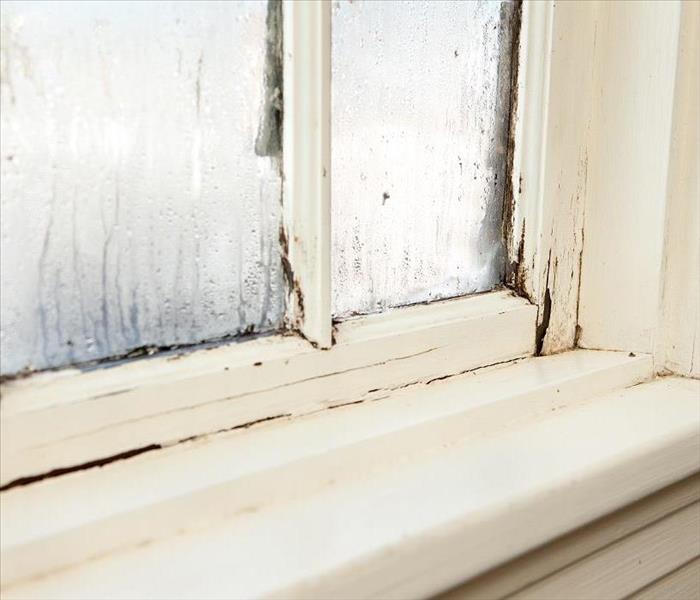 SERVPRO suggest regularly inspecting your windows for damage after a storm to prevent mold growth or other damage to your home.
SERVPRO suggest regularly inspecting your windows for damage after a storm to prevent mold growth or other damage to your home.
Checking Your Windows Regularly Can Prevent Flood Damage
Winter storms and inclement weather carry with them a real risk of flood damage to your home. Floods might cause damage ranging from minor leaks to major structural problems. One area of your house that requires extra care is your windows. Window leaks let water into your home, and if the damage goes unchecked, the wood around your windows is at risk. There is also a potential for mold growth when water pools in dark areas with a suitable fungal food source such as wood or drywall. SERVPRO recommends all Bethlehem homeowners check their windows regularly for signs of damage.
The best way to prevent potential window leaks after flood damage in Bethlehem is regular checks. We suggest that every time the weather is rainy or there is snow or hail, you check your windows afterward for signs of water. You do not need to wait until a significant flood or storm; in fact, it is better if you do not wait, because by then it is too late to take action.
The location of a leak gives you a clue as to its source. Visible water on the window frame or the area where the jamb meets the sash suggests the problem is with the window itself. However, leaks in the area surrounding the frame such as the walls or ceiling may point to a problem elsewhere in the house.
There are some steps you can take to protect windows, such as caulking around them or installing a weather strip. However, if you suspect the problem is with the actual structure around the window, it is a good idea to call in a window specialist to take a look.
If a leaking window causes pooling water or even mold growth in your home, give SERVPRO a call straight away. Our IICRC-certified technicians are waiting to offer assistance. We have all the equipment necessary to extract water from your home and remediate any mold growth situation. We dry the area thoroughly to reduce the risk of mold growth.
For help with leaking windows in Adako, Bethlehem, Bailey Camp, Ellendale and surrounding areas, call SERVPRO of Alexander & Caldwell Counties at (828) 396-1070 today.
For more information regarding Bethlehem, click here.
Why Homeowners Trust SERVPRO's Emergency Water Removal Services in Taylorsville
9/25/2017 (Permalink)
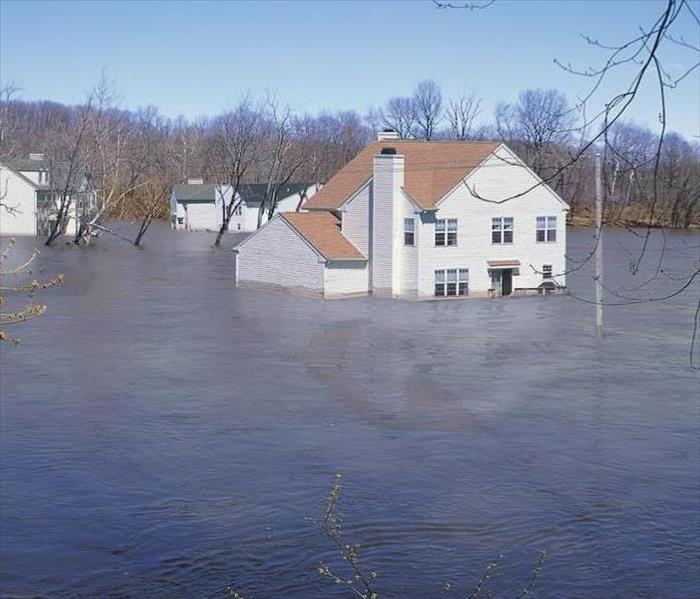 Flooding happens but your quick call to SERVPRO after a storm can make all the difference in the remediation and restoration processes.
Flooding happens but your quick call to SERVPRO after a storm can make all the difference in the remediation and restoration processes.
Our Team Responds Quickly When You Call After a Storm
Whether your home has been completely flooded by a major storm or has much more limited patterns of damage, removing water from the building is likely one of your top priorities. SERVPRO is ready and standing by after any catastrophe to help get your home dry as quickly as possible. Our water removal strategy in Taylorsville is designed to be as timely and efficient as possible to spare work and expenses later, while still being effective at drying out your home even while the rest of the neighborhood remains drenched.
Lightning-Fast Response Times
The core of SERVPRO's Taylorsville water removal strategy is comprised of our mitigation tactics. We have personnel ready around the clock to respond to calls and ensure that as little damage as possible happens in the immediate aftermath of a disaster. Within hours, we show up on the scene with water extractors and air movers to start removing moisture immediately, getting standing and voluminous water out of your home in as little time as possible.
Thorough Work
Getting done quickly is far from the most important aspect of what we do. Above all else, we make sure our work is thorough, so that you can have peace of mind and so that we can continue to provide our services to other homes in need. Machines such as dehumidifiers and deodorizers help to mop up the last vestiges of water in your home and erase any traces of what once happened. We also work closely with insurance companies, who often come to inspect the site and evaluate our performance. Hundreds of insurers across the country prefer SERVPRO because they never find our work lacking. In fact, if a flood or storm has impacted your home, your insurer may have expressly recommended us for restorations.
If your home has been hit by a flood or major storm, be sure to call SERVPRO of Alexander & Caldwell Counties right away at (828) 396-1070 for our 24/7 emergency services.
For more information about the Taylorsville, North Carolina visit: http://www.taylorsvillenc.com/
Handling Water Damage After a Heavy Storm in Taylorsville
9/8/2017 (Permalink)
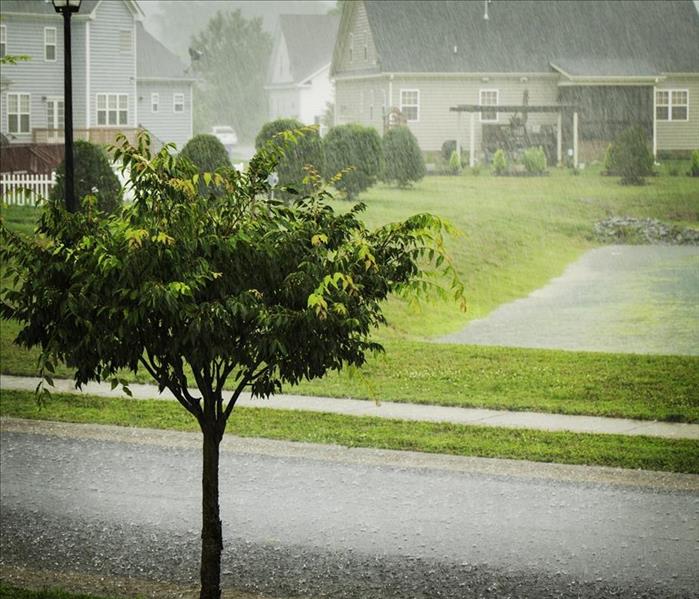 If a storm leaves your home with flood damage, call SERVPRO for professional water removal services.
If a storm leaves your home with flood damage, call SERVPRO for professional water removal services.
Steps to take if you experience flood damage in your home
Tornadoes, hurricanes, and quick summer thunderstorms can all create significant damage to your home. Even though the wind causes damage such as downed trees or torn shingles, heavy rains can lead to flooding, even if you are not along the water. There are some helpful steps you can take after your home in Taylorsville is damaged by water from a storm before help arrives.
Before water damage professionals, such as SERVPRO, arrive, you can remove as much excess water as possible from your Taylorsville home by blotting and mopping. Wipe water from wooden furniture after lamps and other tabletop items are removed. If cushions or upholstery are wet, take them out and prop them up so they can evenly dry. If there are any books or magazines which have gotten wet, pick them up, since the colored covers can stain whatever they are lying on.
During the summer, you run your air conditioner to get rid of the excess water in the air. Since winter is dryer, you may not need to do this in colder months. If the air seems heavy with moisture, you should think about running the AC unit, even if it is colder outside. You can also purchase a dehumidifier if you would rather not run your air conditioner in the colder weather. Also, keep in mind that our technicians at SERVPRO have industrial fans and dehumidifiers that they use to help dry your home out faster.
If whole rooms are flooded, turn off circuit breakers to these rooms to avoid water contacting any electrical appliances. Do not use your vacuum to remove water. Instead, utilize a wet-dry vacuum, or even better, is letting our IICRC-certified technicians use our truck-mounted pumps to remove any standing water after they arrive at your home.
Do not turn on any appliances in a flooded room, and if the water has saturated the ceiling, do not use ceiling lights or fans. If the ceiling is sagging from moisture, do not stand in or walk through the room, since the ceiling could collapse.
When your home is severely flooded, your first step should be to call SERVPRO of Alexander & Caldwell Counties, as it is not safe for you to perform the water removal yourself. Our experienced staff can take care of everything for residents of Bethlehem, Taylorsville, and Lenoir when they call us at (828) 396-1070.
Click here to learn more about Taylorsville, North Carolina.
How To Know If The Flood Damage In Your Taylorsville Home Is Serious
3/9/2017 (Permalink)
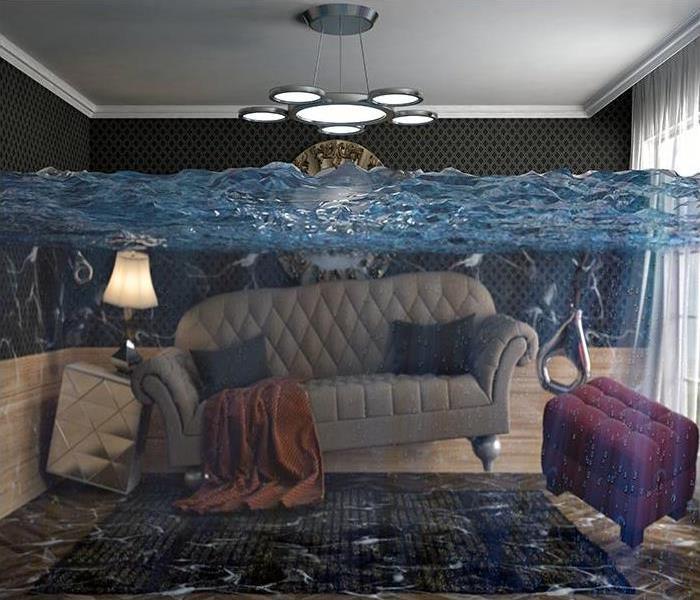 The scope and intensity of the repairs depend on how much water is inside the house and which materials are already wet.
The scope and intensity of the repairs depend on how much water is inside the house and which materials are already wet.
Categories Of Water Intrusion
At SERVPRO, we like to remind our customers that no restoration job is impossible. While severe flooding can lead to complete destruction of some items, there are always others that are salvageable. In fact, as long as repairs get started within two days of the original incident, the chance of full remediation is high.
Nevertheless, the scope and intensity of the repairs depend on how much water is inside the house and which materials are already wet. When handling flood damage in Taylorsville, our technicians carry out an inspection first to determine the level of water intrusion. The assessment adheres to official guidelines from the IICRC. Keep reading to learn more about the categories of water intrusion and what they mean for Taylorsville residents.
Class One
Class one involves minimal water intrusion, which means that this is the least serious type of water damage. Most items affected are non-porous (concrete floors, appliances, etc.) In this case, only limited repairs are necessary. Pumping is enough to extract most of the liquid, after which a small dehumidifier can be used to complete the job. Typical Scenario: a toilet overflows onto a sealed tile floor.
Class Two
There is a significant volume of water. Several porous items are affected (curtains, carpets, etc.) The extraction takes longer, in this case, because more water is absorbed. Dehumidifiers are used (for longer periods) to draw water vapor out of soft materials. Typical Scenario: a burst water pipe inside a gypsum board wall.
Class Three
Substantial amounts of standing water remain after the incident. Many porous items have absorbed flood liquids. The most intensive rates of evaporation are required to extract it in a timely fashion. The SERVPRO technicians probably need to lift carpets and (in some cases) make holes in the walls to increase ventilation. Typical Scenario: natural flooding causes rapid water intrusion, which quickly soaks the ground floor.
Class Four
The most severe type of flood damage involves water that gets trapped between building materials. It is tough to handle, takes a long time to restore, and it does cause lengthy disruptions to regular routines. The drying process is complex and requires the use of considerable vapor pressure differentials. Typical Scenario: a severe sewage overflow or backup which soaks through the walls.
At SERVPRO of Alexander & Caldwell Counties, we approach every emergency with a unique strategy. Our repair methods are tailored to fit the needs of your home and guarantee a fast, effective restoration. Call us 24/7 at (828) 396-1070 today.
Storm Waters Can Damage A Bethlehem Bakery
2/13/2017 (Permalink)
 A Bakery in Bethlehem Loves SERVPRO For Extracting Storm Water
A Bakery in Bethlehem Loves SERVPRO For Extracting Storm Water
SERVPRO Dries Out Residents and Businesses After Storm Related Water Intrusion
Businesses can suffer much less damage from a severe storm than a residence and still have to close their doors permanently. Each hour and day of clean-up are more important to saving not just a building, but an income and a contributor to the community as well.
A building like a Bethlehem bakery after a storm can lose its functionality and close its doors permanently after a few days of water damage has ruined equipment beyond repair. SERVPRO has the training not just to respond quickly, but to properly clean and restore a facility to bring it back in line with city health codes, if at all possible. Storm-induced flooding does not have to have a lasting effect on your business.
The first step is getting rid of the water. For standing water, even in a large kitchen and customer service area, our technicians use commercial grade pumps to remove inches and even a foot of water in a matter of hours. With the visible water gone, our response team can tackle the next two items: drying out property and hidden water extraction.
Expensive industrial items such as commercial ovens are usually above most high water points but can suffer damage in a massive plumbing failure. Technicians must completely dry the electronics and heating elements before allowing the owner to use them again. Since it is not possible to disassemble these industrial appliances without violating warranties or possibly damaging them further, our technicians use commercial space heaters and dehumidifiers.
Both equipment items draw out moisture from the surrounding air and off of nearby surfaces. These techniques leave a dry surface without the chance of threads from towels or pieces of sponge accidentally being left behind to contaminate the next batch of cupcakes.
As this happens, other technicians dry out the building itself. Water extraction tools draw out moisture from floors, walls, and property items such as display cases. We accomplish this using commercial grade extraction wands that combine heat and vacuum to pull water droplets from between and underneath floor tiles and sections of concrete. Response team members also use the same heaters and dehumidifiers in corners to speed up drying walls, cabinets, and underneath counters.
SERVPRO of Alexander & Caldwell Counties understands that every hour your business is closed means income lost and customers go un-served. Count on a strong effort from a component of the SERVPRO large-loss storm team. Despite an improving economy, small business owners are still operating on narrow margins and even a weekend lost can mean not making payroll or loan payments. To prevent this from happening, call us at (828) 396-1070 to restore your business and your livelihood.
Avoiding Health Hazards and Responding to Flood Damage in Lenoir Homes
12/15/2016 (Permalink)
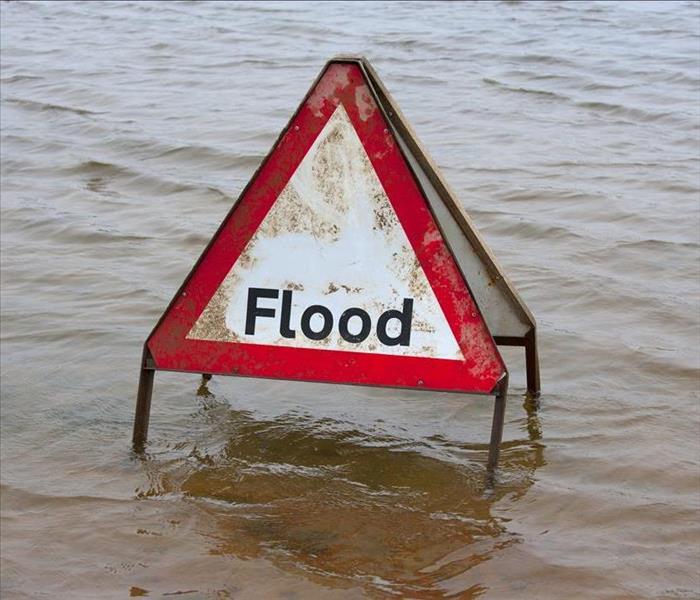 Safety First with Flooding in Lenoir
Safety First with Flooding in Lenoir
Safety and Mitigation of Storm Damaged Possessions Are Crucial
When natural floods occur, the essential boundaries between humans and the elements are broken down. The pressure and force of moving water are often enough to cause serious damage to purification and sewage systems. In the most extreme cases, chemicals and toxic waste end up in the floodwaters which infiltrate homes.
This is why it's really important for homeowners to seek professional advice. At SERVPRO, we deal with incidents of severe water damage on a daily basis. We're Faster To Any Size Disaster. Our job is not just to reverse the Lenoir storm damage and restore your home to its original condition; we'll also make it safe again. This means eliminating all traces of toxic materials in the water and your home.
If your home has recently flooded, there are a few things that you can do to keep yourself safe until the SERVPRO team arrives.
Find Alternative Shelter
If possible, find a clean, dry place to stay while the flooding in your home is being repaired. It isn't healthy to remain among damp furniture, carpets, or drywall, even if there is no standing water. There may be bacteria, pathogens, and chemicals on the walls and floors. Call SERVPRO, explain the severity of the flooding and we'll make our way to the property as quickly as possible.
Keep Your Hands Clean
If you have had contact with floodwater, you need to wash your hands thoroughly. Do this every time you get your hands wet and then leave the site. Don't prepare or touch food until you've washed with soap and water. If the flooding isn't too severe, you may be able to move items outside of the property and away from the saturation points. Where possible, store them away from unaffected possessions, as they may need disinfecting.
Drink Bottled Water
SERVPRO strongly advises you to steer clear of the main water supply, until we have verified (in conjunction with local authorities) that it is safe to drink. Flooding can infect the water supply with chemicals and toxins. All homeowners should drink bottled water or, at least, boil their water before drinking.
Reach Out for Help
Flood repair and restoration experts from SERVPRO provide more than just practical help. We are a valuable source of information and support. Our technicians can tell you everything that you need to know about flood damage restoration. They will be frank and honest about what can be salvaged (usually a lot) and what is too degraded to be saved. They will work closely with you to inventory your possessions and clean, restore, and repair as many items as possible. If you have insurance coverage, the final disposition of storm damaged items is your decision to make.
All forms of flooding can be stressful, but natural flooding has a tendency to make homeowners feel helpless. With the support of SERVPRO of Alexander and Caldwell Counties, you don't have to be. We can help you take back control and get repairs started quickly. Call us 24/7 on (828) 396-1070.
The Importance of Mitigating Flood Damage
9/20/2016 (Permalink)
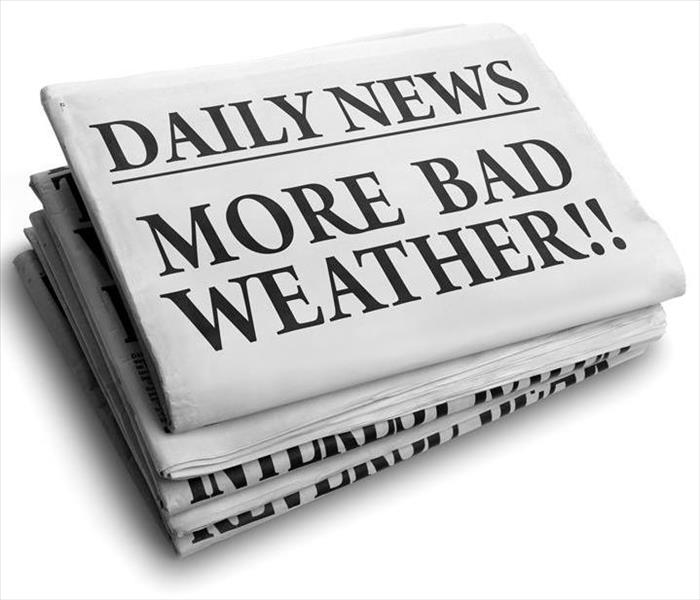 Be Prepared For Storm Damage in Taylorsville
Be Prepared For Storm Damage in Taylorsville
Water Damage Is Reduced from Flooding When SERVPRO Is Called for Help
At SERVPRO, we pursue an aggressive strategy of mitigation, meaning we send out crews 24/7 as quickly as possible to respond rapidly to a scene and stop further damage from occurring. Some disasters rely on mitigation more than others, and flood damage is one of the more significant mitigation topics. We urge homeowners who have fallen victim to a flood to contact us as soon as possible, as a speedy response makes a big difference in how much time and money the situation ends up costing you.
Stopping Seepage and Penetration
When water floods an area, every nook and cranny are susceptible to significant water damage. If we can't respond quickly to a case of flood damage in Taylorsville, water will begin to work its way through cracks and corners into deeper regions of your home. In the worst cases, when the homeowner is away or unaware of the damage, it can even seep into and damage the building foundation.
Preventing Mold Growth and Further Infection
Floodwaters breed mold, fungi, and present an environment for insects and microbes to expand in great numbers quickly. Early removal of floodwater is critical in stopping the growth and reproduction of these unwanted consequences, and to your health, as some of these organisms may cause health effects. We will also need to initiate a thorough drying process to free the area from mold's grip, and pumping out water quickly is a vital first step to diminishing these effects.
Keeping Conditions Under Control
Floods tend to open up areas to conditions that propagate further damage to the home, manipulating factors such as temperature, humidity, and air flow in the home. If we can respond quickly enough, we can set up equipment to control these variables before the flood ever gets a chance to disrupt the internal elements of the structure.
SERVPRO of Alexander & Caldwell Counties employs a strategy of mitigation to help prevent as much damage as possible to your home in the event of a disaster. If your home has been flooded, call us right away 24/7 at (828) 396-1070 so that we can respond quickly and begin to mitigate damage.






 24/7 Emergency Service
24/7 Emergency Service





































